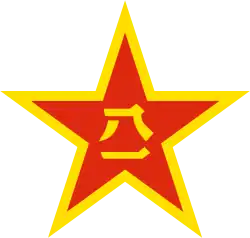Xi Jinping
Xi Jinping (/ˌʃiː dʒɪnˈpɪŋ/ SHEE jin-PING; Chinese: 习近平; born 15 June 1953) is a Chinese politician who has served as General Secretary of the Chinese Communist Party (CCP) and Chairman of the Central Military Commission (CMC) since 2012, and President of the People's Republic of China (PRC) since 2013. Xi has been the paramount leader of China, the most prominent political leader in China, since 2012.
Xi Jinping | |||||||||||||||||||||||||||||||||||||||||||||||||
|---|---|---|---|---|---|---|---|---|---|---|---|---|---|---|---|---|---|---|---|---|---|---|---|---|---|---|---|---|---|---|---|---|---|---|---|---|---|---|---|---|---|---|---|---|---|---|---|---|---|
习近平 | |||||||||||||||||||||||||||||||||||||||||||||||||
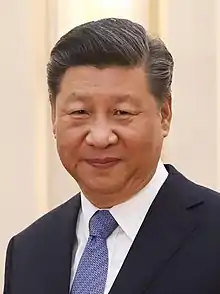 Xi in May 2019 | |||||||||||||||||||||||||||||||||||||||||||||||||
| General Secretary of the Chinese Communist Party | |||||||||||||||||||||||||||||||||||||||||||||||||
| Assumed office 15 November 2012 | |||||||||||||||||||||||||||||||||||||||||||||||||
| Preceded by | Hu Jintao | ||||||||||||||||||||||||||||||||||||||||||||||||
| President of the People's Republic of China | |||||||||||||||||||||||||||||||||||||||||||||||||
| Assumed office 14 March 2013 | |||||||||||||||||||||||||||||||||||||||||||||||||
| Premier | Li Keqiang | ||||||||||||||||||||||||||||||||||||||||||||||||
| Vice President | |||||||||||||||||||||||||||||||||||||||||||||||||
| Preceded by | Hu Jintao | ||||||||||||||||||||||||||||||||||||||||||||||||
| Chairman of the Central Military Commission | |||||||||||||||||||||||||||||||||||||||||||||||||
Assumed office
| |||||||||||||||||||||||||||||||||||||||||||||||||
| Deputy | |||||||||||||||||||||||||||||||||||||||||||||||||
| Preceded by | Hu Jintao | ||||||||||||||||||||||||||||||||||||||||||||||||
| First Secretary of Secretariat of the Chinese Communist Party | |||||||||||||||||||||||||||||||||||||||||||||||||
| In office 22 October 2007 – 15 November 2012 | |||||||||||||||||||||||||||||||||||||||||||||||||
| General Secretary | Hu Jintao | ||||||||||||||||||||||||||||||||||||||||||||||||
| Preceded by | Zeng Qinghong | ||||||||||||||||||||||||||||||||||||||||||||||||
| Succeeded by | Liu Yunshan | ||||||||||||||||||||||||||||||||||||||||||||||||
| Vice President of the People's Republic of China | |||||||||||||||||||||||||||||||||||||||||||||||||
| In office 15 March 2008 – 14 March 2013 | |||||||||||||||||||||||||||||||||||||||||||||||||
| President | Hu Jintao | ||||||||||||||||||||||||||||||||||||||||||||||||
| Preceded by | Zeng Qinghong | ||||||||||||||||||||||||||||||||||||||||||||||||
| Succeeded by | Li Yuanchao | ||||||||||||||||||||||||||||||||||||||||||||||||
| Personal details | |||||||||||||||||||||||||||||||||||||||||||||||||
| Born | 15 June 1953 Beijing, People's Republic of China | ||||||||||||||||||||||||||||||||||||||||||||||||
| Political party | Communist Party of China | ||||||||||||||||||||||||||||||||||||||||||||||||
| Spouse(s) |
| ||||||||||||||||||||||||||||||||||||||||||||||||
| Children | Xi Mingze (daughter) | ||||||||||||||||||||||||||||||||||||||||||||||||
| Parents |
| ||||||||||||||||||||||||||||||||||||||||||||||||
| Relatives |
| ||||||||||||||||||||||||||||||||||||||||||||||||
| Residence | Zhongnanhai | ||||||||||||||||||||||||||||||||||||||||||||||||
| Education | Tsinghua University (BE, LLD)[note 1] | ||||||||||||||||||||||||||||||||||||||||||||||||
| Signature |  | ||||||||||||||||||||||||||||||||||||||||||||||||
| Military service | |||||||||||||||||||||||||||||||||||||||||||||||||
| Allegiance | |||||||||||||||||||||||||||||||||||||||||||||||||
| Branch/service | |||||||||||||||||||||||||||||||||||||||||||||||||
| Years of service | 1979–1982 | ||||||||||||||||||||||||||||||||||||||||||||||||
| Unit | General Office of the Central Military Commission (1979–1982, as a secretary of Defense Minister Geng Biao) | ||||||||||||||||||||||||||||||||||||||||||||||||
| Chinese name | |||||||||||||||||||||||||||||||||||||||||||||||||
| Simplified Chinese | 习近平 | ||||||||||||||||||||||||||||||||||||||||||||||||
| Traditional Chinese | 習近平 | ||||||||||||||||||||||||||||||||||||||||||||||||
| |||||||||||||||||||||||||||||||||||||||||||||||||
Central institution membership
Leading Groups and Commissions
Other offices held
the People's Republic of China
| |||||||||||||||||||||||||||||||||||||||||||||||||
| ||
|---|---|---|
|
Policies and theories
Key events
Diplomatic activities
|
||
 | ||
The son of Chinese Communist veteran Xi Zhongxun, he was exiled to rural Yanchuan County as a teenager following his father's purge during the Cultural Revolution, and lived in a cave in the village of Liangjiahe, where he joined the CCP and worked as the party secretary. After studying chemical engineering at Tsinghua University as a "Worker-Peasant-Soldier student", Xi rose through the ranks politically in China's coastal provinces. Xi was Governor of Fujian from 1999 to 2002, before becoming Governor and Party Secretary of neighbouring Zhejiang from 2002 to 2007. Following the dismissal of the Party Secretary of Shanghai, Chen Liangyu, Xi was transferred to replace him for a brief period in 2007. He subsequently joined the Politburo Standing Committee and served as first secretary of the Central Secretariat in October 2007. In 2008 he was designated as Hu Jintao's presumed successor as paramount leader; to that end, Xi was appointed Vice President of the People's Republic of China and Vice Chairman of the Central Military Commission. He officially received the title of "leadership core" from the Chinese Communist Party (CCP) in 2016. Xi has also been a member of the 17th, 18th, 19th CCP Politburo Standing Committee since 2007. In 2018, he abolished presidential term limits, allowing him to rule indefinitely.
Xi is the first CCP General Secretary born after the establishment of the People's Republic of China. Since assuming power, Xi has introduced far-ranging measures to enforce party discipline and to impose internal unity. His anti-corruption campaign has led to the downfall of prominent incumbent and retired Communist Party officials, including members of the Politburo Standing Committee. He has also enacted or promoted a more assertive foreign policy, particularly with regard to China–Japan relations, China's claims in the South China Sea, and its advocacy for free trade and globalization. He has sought to expand China's African and Eurasian influence through the Belt and Road Initiative.
As the central figure of the fifth generation of leadership of the People's Republic, Xi has significantly centralised institutional power by taking on a wide range of leadership positions, including chairing the newly formed CCP National Security Commission, as well as new steering committees on economic and social reforms, military restructuring and modernization, and the internet.[2]
Xi's political thoughts have been incorporated into the party and state constitutions.[3][4][5] He has often been described as a dictator or an authoritarian leader[16] by political and academic observers, citing an increase of censorship and mass surveillance, a deterioration in human rights, the cult of personality developing around him, and the removal of term limits for the leadership under his tenure.[lower-alpha 1]
Early life and education

Xi Jinping was born in Beijing on 15 June 1953, the second son of Xi Zhongxun and his wife Qi Xin. After the founding of the People's Republic of China in 1949 by Mao Zedong, Xi's father held a series of posts, including Party propaganda chief, vice-premier, and Vice Chairperson of the National People's Congress.[29] Xi had two older sisters, Qiaoqiao, born in 1949 and An'an (安安; Ān'ān), born in 1952.[30][31] Xi's father was from Fuping County, Shaanxi, and Xi could further trace his patrilineal descent from Xiying in Dengzhou, Henan.[32]
Xi went to the Beijing No. 25 School,[33] and then Beijing Bayi School,[34][35] in the 1960s. He became friends with Liu He, who attended Beijing No. 101 School in the same district, who later became China's vice-premier and a close advisor to Xi after he became China's paramount leader.[36][37] In 1963, when he was age 10, his father was purged from the Party and sent to work in a factory in Luoyang, Henan.[38] In May 1966, the Cultural Revolution cut short Xi's secondary education when all secondary classes were halted for students to criticise and fight their teachers. Student militants ransacked the Xi family home and one of Xi's sisters, Xi Heping, committed suicide from the pressure.[39] Later, his mother was forced to publicly denounce his father, as he was paraded before a crowd as an enemy of the revolution. His father was later thrown into prison in 1968 when Xi was aged 15. Without the protection of his father, Xi was sent to work in Liangjiahe Village, Wen'anyi Town, Yanchuan County, Yan'an, Shaanxi, in 1969 in Mao Zedong's Down to the Countryside Movement.[40] He worked as the party secretary of Liangjiahe, where he lived in a cave house.[41] After a few months, unable to stand rural life, he ran away to Beijing. He was arrested during a crackdown on deserters from the countryside and sent to a work camp to dig ditches.[42]
The misfortunes and suffering of his family in his early years hardened Xi's view of politics. During an interview in 2000, he said, "People who have little contact with power, who are far from it, always see these things as mysterious and novel. But what I see is not just the superficial things: the power, the flowers, the glory, the applause. I see the bullpens and how people can blow hot and cold. I understand politics on a deeper level." The bullpens was a reference to Red Guards' detention houses during the Cultural Revolution.[43]
After being rejected seven times, Xi joined the Communist Youth League of China in 1971 by befriending a local official.[44] He reunited with his father in 1972, because of a family reunion ordered by Premier Zhou Enlai.[39] From 1973, he applied to join the Chinese Communist Party ten times and was finally accepted on his tenth attempt in 1974.[45][46]
From 1975 to 1979, Xi studied chemical engineering at Beijing's Tsinghua University as a "Worker-Peasant-Soldier student". The engineering majors there spent about 15 percent of their time studying Marxism–Leninism–Mao Zedong thought and 5 percent of their time doing farm work and "learning from the People's Liberation Army".[47]
Rise to power
From 1979 to 1982, Xi served as secretary for his father's former subordinate Geng Biao, the then vice premier and secretary-general of the Central Military Commission. This gained Xi some military background.[44] In 1985, as part of a Chinese delegation to study U.S. agriculture, he stayed in the home of an American family in the town of Muscatine, Iowa. This trip, and his two-week stay with a U.S. family, is said to have had a lasting impression upon him and his views on the United States.[48]
In 1982, he was sent to Zhengding County in Hebei as deputy party secretary of Zhengding County. He was promoted in 1983 to secretary, becoming the top official of the county.[49] Xi subsequently served in four provinces during his regional political career: Hebei (1982–1985), Fujian (1985–2002), Zhejiang (2002–2007), and Shanghai (2007).[50] Xi held posts in the Fuzhou Municipal Party Committee and became the president of the Party School in Fuzhou in 1990. In 1997, he was named an alternate member of the 15th Central Committee of the Communist Party of China. However, of the 151 alternate members of the Central Committee elected at the 15th Party Congress, Xi received the lowest number of votes in favour, placing him last in the rankings of members, ostensibly due to his status as a princeling.[note 2][51]
From 1998 to 2002, Xi studied Marxist theory and ideological education in Tsinghua University,[52] graduating from there with a doctorate in law and ideology in 2002.[53] In 1999, he was promoted to the office of Vice Governor of Fujian, then he became governor a year later. In Fujian, Xi made efforts to attract investment from Taiwan and to strengthen the private sector of the provincial economy.[54] In February 2000, he and then-provincial Party Secretary Chen Mingyi were called before the top members of the Party Central Politburo Standing Committee of the Communist Party of China – General Secretary Jiang Zemin, Premier Zhu Rongji, Vice-President Hu Jintao and Discipline Inspection Secretary Wei Jianxing – to explain aspects of the Yuanhua scandal.[55]
In 2002, Xi left Fujian and took up leading political positions in neighbouring Zhejiang. He eventually took over as provincial Party Committee Secretary after several months as acting governor, occupying a top provincial office for the first time in his career. In 2002, he was elected a full member of the 16th Central Committee, marking his ascension to the national stage. While in Zhejiang, Xi presided over reported growth rates averaging 14% per year.[56] His career in Zhejiang was marked by a tough and straightforward stance against corrupt officials. This earned him a name in the national media and drew the attention of China's top leaders.[57]
Following the dismissal of Shanghai Party secretary Chen Liangyu in September 2006 due to a social security fund scandal, Xi was transferred to Shanghai in March 2007 where he was the party secretary there for seven months.[58][59] In Shanghai, Xi avoided controversy and was known for strictly observing party discipline. For example, Shanghai administrators attempted to earn favour with him by arranging a special train to shuttle him between Shanghai and Hangzhou for him to complete handing off his work to his successor as Zhejiang party secretary Zhao Hongzhu. However, Xi reportedly refused to take the train, citing a loosely enforced party regulation which stipulated that special trains can only be reserved for "national leaders".[60] While in Shanghai, he worked on preserving unity of the local party organisation. He pledged there would be no 'purges' during his administration, despite the fact many local officials were thought to have been implicated in the Chen Liangyu corruption scandal.[61] On most issues Xi largely echoed the line of the central leadership.[62]
Politburo Standing Committee member
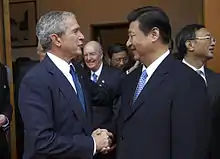
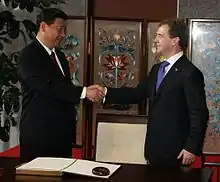
Xi was appointed to the nine-man Politburo Standing Committee of the Communist Party of China at the 17th Party Congress in October 2007. He was ranked above Li Keqiang, an indication that he was going to succeed Hu Jintao as China's next leader. In addition, Xi also held the first secretary of the Communist Party's Central Secretariat. This assessment was further supported at the 11th National People's Congress in March 2008, when Xi was elected as vice-president of the People's Republic of China.[63] Following his elevation, Xi has held a broad range of portfolios. He was put in charge of the comprehensive preparations for the 2008 Summer Olympics in Beijing, as well as being the central government's leading figure in Hong Kong and Macau affairs. In addition, he also became the new president of the Central Party School of the Communist Party of China, the cadre-training and ideological education wing of the Communist Party. In the wake of the 2008 Sichuan earthquake, Xi visited disaster areas in Shaanxi and Gansu. He made his first foreign trip as vice president to North Korea, Mongolia, Saudi Arabia, Qatar and Yemen from 17 to 25 June 2008.[64] After the Olympics, Xi was assigned the post of committee chair for the preparations of the 60th Anniversary Celebrations of the founding of the People's Republic of China. He was also reportedly at the helm of a top-level Communist Party committee dubbed the 6521 Project, which was charged with ensuring social stability during a series of politically sensitive anniversaries in 2009.[65]
Xi's position as the apparent successor to become the paramount leader was threatened with the rapid rise of Bo Xilai, the party secretary of Chongqing at the time. Bo was expected to join the Politburo Standing Committee at the 18th Party Congress, with the possibility of creating a counterweight to Xi, or even replacing him.[66] Bo's policies in Chongqing inspired imitations throughout China and received praise from Xi himself during Xi's visit to Chongqing in 2010. Records of praises from Xi were later erased after he became paramount leader. Xi's position as successor was secured with Bo's downfall after the Wang Lijun incident.[67]
Xi is considered one of the most successful members of the Crown Prince Party, a quasi-clique of politicians who are descendants of early Chinese Communist revolutionaries. Former prime minister of Singapore, Lee Kuan Yew, when asked about Xi, said he felt he was "a thoughtful man who has gone through many trials and tribulations".[68] Lee also commented: "I would put him in the Nelson Mandela class of persons. A person with enormous emotional stability who does not allow his personal misfortunes or sufferings affect his judgment. In other words, he is impressive".[69] Former U.S. Treasury Secretary Henry Paulson described Xi as "the kind of guy who knows how to get things over the goal line".[70] Australian Prime Minister Kevin Rudd said that Xi "has sufficient reformist, party and military background to be very much his own man".[71]
Trips as Vice President and Mexico commentary incident
In February 2009, in his capacity as vice-president, Xi Jinping embarked on a tour of Latin America, visiting Mexico,[72] Jamaica,[73] Colombia,[74] Venezuela,[75] and Brazil[76] to promote Chinese ties in the region and boost the country's reputation in the wake of the global financial crisis. He also visited Valletta, Malta, before returning to China.[77]
On 11 February, while visiting Mexico, Xi spoke in front of a group of overseas Chinese and explained China's contributions to the financial crisis, saying that it was "the greatest contribution towards the whole of human race, made by China, to prevent its 1.3 billion people from hunger".[note 3] He went on to remark: "There are some bored foreigners, with full stomachs, who have nothing better to do than point fingers at us. First, China doesn't export revolution; second, China doesn't export hunger and poverty; third, China doesn't come and cause you headaches. What more is there to be said?"[note 4][78] The story was reported on some local television stations. The news led to a flood of discussions on Chinese Internet forums and it was reported that the Chinese Ministry of Foreign Affairs was caught off-guard by Xi's remarks, as the actual video was shot by some accompanying Hong Kong reporters and broadcast on Hong Kong TV, which then turned up on various Internet video websites.[79]
In the European Union, Xi visited Belgium, Germany, Bulgaria, Hungary and Romania from 7 to 21 October 2009.[80] He visited Japan, South Korea, Cambodia, and Myanmar on his Asian trip from 14 to 22 December 2009.[81] He later visited the United States, Ireland and Turkey in February 2012. This visit included meeting with then U.S. President Barack Obama at the White House[82] and then Vice President Joe Biden; and stops in California and Iowa, where he met with the family which previously hosted him during his 1985 tour as a Hebei provincial official.[83]
Disappearance
A few months before his ascendancy to the party leadership, Xi disappeared from official media coverage for several weeks beginning on 1 September 2012. On 4 September, he cancelled a meeting with U.S. Secretary of State Hillary Clinton, and later also cancelled meetings with Singapore's Prime Minister Lee Hsien Loong and a top Russian official. It was said that Xi effectively "went on strike" in preparation for the power transition in order to install political allies in key roles.[44] The Washington Post reported from a single source that Xi may have been injured in an altercation during a meeting of the "red second generation" which turned violent.[84]
Leadership
Accession to top posts
On 15 November 2012, Xi was elected to the posts of general secretary of the Communist Party and chairman of the CCP Central Military Commission by the 18th Central Committee of the Communist Party of China. This made him, informally, the paramount leader and the first to be born after the founding of the People's Republic of China. The following day Xi led the new line-up of the Politburo Standing Committee onto the stage in their first public appearance.[85] The new Standing Committee reduced its number of seats from nine to seven, with only Xi himself and Li Keqiang retaining their seats from the previous Standing Committee; the remaining members were new.[86][87][88] In a marked departure from the common practice of Chinese leaders, Xi's first speech as general secretary was plainly worded and did not include any political slogans or mention of his predecessors.[89] Xi mentioned the aspirations of the average person, remarking, "Our people ... expect better education, more stable jobs, better income, more reliable social security, medical care of a higher standard, more comfortable living conditions, and a more beautiful environment." Xi also vowed to tackle corruption at the highest levels, alluding that it would threaten the Party's survival; he was reticent about far-reaching economic reforms.[90]
In December 2012, Xi visited Guangdong in his first trip outside Beijing since taking the Party leadership. The overarching theme of the trip was to call for further economic reform and a strengthened military. Xi visited the statue of Deng Xiaoping and his trip was described as following in the footsteps of Deng's own southern trip in 1992, which provided the impetus for further economic reforms in China after conservative party leaders stalled many of Deng's reforms in the aftermath of the Tiananmen Square protests of 1989. On his trip, Xi consistently alluded to his signature slogan the "Chinese Dream". "This dream can be said to be the dream of a strong nation. And for the military, it is a dream of a strong military", Xi told sailors.[91] Xi's trip was significant in that he departed from the established convention of Chinese leaders' travel routines in multiple ways. Rather than dining out, Xi and his entourage ate regular hotel buffet. He travelled in a large van with his colleagues rather than a fleet of limousines, and did not restrict traffic on the parts of the highway he travelled.[92]
Xi was elected President of the People's Republic of China on 14 March 2013, in a confirmation vote by the 12th National People's Congress in Beijing. He received 2,952 for, one vote against, and three abstentions.[85] He replaced Hu Jintao, who retired after serving two terms.[93] In his new capacity as president, on 16 March 2013 Xi expressed support for non-interference in China–Sri Lanka relations amid a United Nations Security Council vote to condemn that country over government abuses during the Sri Lankan Civil War.[94] On 17 March, Xi and his new ministers arranged a meeting with the chief executive of Hong Kong, CY Leung, confirming his support for Leung.[95] Within hours of his election, Xi discussed cyber security and North Korea with U.S. President Barack Obama over the phone. Obama announced the visits of treasury and state secretaries Jacob Lew and John F. Kerry to China the following week.[96]
Anti-corruption campaign
Xi vowed to crack down on corruption almost immediately after he ascended to power at the 18th Party Congress. In his inaugural speech as general secretary, Xi mentioned that fighting corruption was one of the toughest challenges for the party.[97] A few months into his term, Xi outlined the "eight-point guide", listing rules intended to curb corruption and waste during official party business; it aimed at stricter discipline on the conduct of party officials. Xi also vowed to root out "tigers and flies", that is, high-ranking officials and ordinary party functionaries.[98]
During the first three years of Xi's term, he initiated cases against former Central Military Commission vice-chairmen Xu Caihou and Guo Boxiong, former Politburo Standing Committee member and security chief Zhou Yongkang and former Hu Jintao chief aide Ling Jihua.[99] Along with new disciplinary chief Wang Qishan, Xi's administration spearheaded the formation of "centrally-dispatched inspection teams" (中央巡视组). These were essentially cross-jurisdictional squads of officials whose main task was to gain more in-depth understanding of the operations of provincial and local party organizations, and in the process, also enforce party discipline mandated by Beijing. Many of the work teams also had the effect of identifying and initiating investigations of high-ranking officials. Over one hundred provincial-ministerial level officials were implicated during a massive nationwide anti-corruption campaign. These included former and current regional officials (Su Rong, Bai Enpei, Wan Qingliang), leading figures of state-owned enterprises and central government organs (Song Lin, Liu Tienan), and highly ranked generals in the military (Gu Junshan). In June 2014, the Shanxi provincial political establishment was decimated, with four officials dismissed within a week from the provincial party organization's top ranks. Within the first two years of the campaign alone, over 200,000 low-ranking officials received warnings, fines, and demotions.[100]
The campaign has led to the downfall of prominent incumbent and retired Communist Party officials, including members of the Politburo Standing Committee.[101] Xi's anti-corruption campaign is seen by critics as a political purge on a scale not seen since Chairman Mao, with the aim of removing potential opponents and consolidating power. Xi's establishment of a new anti-corruption agency, the National Supervision Commission, that is ranked higher than the supreme court, has been described by Amnesty International's East Asia director as a "systemic threat to human rights" which "places tens of millions of people at the mercy of a secretive and virtually unaccountable system that is above the law."[102][103]
Censorship
"Document No. 9" is a confidential internal document widely circulated within the Chinese Communist Party in 2013 by the party's General Office.[104][105] It was first published in July 2012.[106] The document warns of seven dangerous Western values:
- Constitutional democracy, which includes such tenets as multi-party systems, the separation of powers, general elections, and judicial independence;[107]
- Universal values, a notion contrary to Maoist doctrine, whereby the Western value system transcends nation in class, and applies to China.[108][109]
- Civil society, the notion that individual rights are paramount, rather than the collective rights established by the Party;
- Pro-market neoliberalism, referring to libertarian economic values and globalization;[110]
- Media independence, as Xi was especially hostile to Western ideas of journalism and the notion of a press that could criticize government and Party policies;
- Historical nihilism, meaning the criticism of past errors; and
- Questioning the nature of Chinese style socialism.[111]
Coverage of these topics in educational materials is forbidden.[112] Although it predates Xi Jinping's formal rise to the top party and state posts, the release of this internal document, which has introduced new topics that were previously not "off-limits," was seen as Xi's recognition of the "sacrosanct" nature of Communist Party rule over China.[111]
Internet censorship
Since Xi became the CCP General Secretary, internet censorship in China has been significantly stepped up.[113][114] Chairing the 2018 China Cyberspace Governance Conference on 20 and 21 April 2018, Xi committed to "fiercely crack down on criminal offenses including hacking, telecom fraud, and violation of citizens' privacy."[115] His administration has also overseen more Internet restrictions imposed in China, and is described as being "stricter across the board" on speech than previous administrations.[116] Xi has taken a very strong stand to control internet usage inside China, including Google and Facebook,[117] advocating Internet censorship in the country as the concept of "internet sovereignty."[118][119] The censorship of Wikipedia has also been stringent; as of April 2019, all versions of Wikipedia have been blocked in China.[120] Likewise, the situation for users of Weibo has been described as a change from fearing that individual posts would be deleted, or at worst one's account, to fear of arrest.[121] A law enacted in September 2013 authorized a three-year prison term for bloggers who shared more than 500 times any content considered "defamatory."[122] The State Internet Information Department summoned a group of influential bloggers to a seminar instructing them to avoid writing about politics, the Communist Party, or making statements contradicting official narratives. Many bloggers stopped writing about controversial topics, and Weibo went into decline, with much of its readership shifting to WeChat users speaking to very limited social circles.[122] In 2017, telecommunications carriers in China were instructed by the government to block individuals' use of Virtual Private Networks (VPNs) by February 2018.[123]
Winnie the Pooh caricature and censorship

Comparisons between Xi and the Disney character Winnie the Pooh are censored on Chinese internet following the spread of an internet meme in which photographs of Xi were compared to the bear.[124] The first heavily censored viral meme can be traced back to the official visit to the United States in 2013 during which Xi was photographed by a Reuters photographer walking with then-US President Barack Obama in Sunnylands, California. A blog post where the photograph was juxtaposed with the cartoon depiction went viral,[125][126][127] but Chinese censors rapidly deleted it.[128] When Shinzo Abe met Xi the following year, a photograph of the meeting, again juxtaposed to a cartoon, went viral.[125][126] When Xi Jinping inspected troops through his limousine's sunroof, a popular meme was created with Winnie the Pooh in a toy car. The widely circulated image became the most censored picture of the year.[125]
In 2018, the Winnie the Pooh film Christopher Robin was denied a Chinese release,[127][129] following an incident where Chinese authorities censored a nine-year-old for comments about Xi's weight.[130] After the 2020 China–India skirmishes, Indians used depiction of Winnie the Pooh to mock Xi Jinping. The Twitter hashtag WinniethePooh was used for tweets critical of China's actions.[131]
Consolidation of power
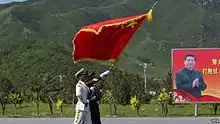
Political observers have called Xi the most powerful Chinese leader since Chairman Mao Zedong, especially since the ending of presidential two-term limits in 2018.[132][133][134][135] Xi has notably departed from the collective leadership practices of his post-Mao predecessors. He has centralised his power and created working groups with himself at the head to subvert government bureaucracy, making himself become the unmistakable central figure of the new administration.[136] Beginning in 2013, the party under Xi has created a series of new "Central Leading Groups"; supra-ministerial steering committees, designed to bypass existing institutions when making decisions, and ostensibly make policy-making a more efficient process. The most notable new body is the Central Leading Group for Comprehensively Deepening Reforms. It has broad jurisdiction over economic restructuring and social reforms, and is said to have displaced some of the power previously held by the State Council and its premier.[137] Xi also became the leader of the Central Leading Group for Internet Security and Informatization, in charge of cyber-security and Internet policy. The Third Plenum held in 2013 also saw the creation of the National Security Commission of the Communist Party of China, another body chaired by Xi which commentators have said would help Xi consolidate over national security affairs.[138][139] In the opinion of at least one political scientist, Xi "has surrounded himself with cadres he met while stationed on the coast, Fujian and Shanghai and in Zhejiang."[140] Control of Beijing is seen as crucial to Chinese leaders; Xi has selected Cai Qi, one of the cadres mentioned above, to manage the capital.[141]
Cult of personality
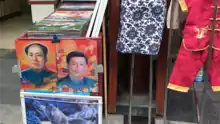
Xi has had a cult of personality constructed around himself since entering office[4][5] with books, cartoons, pop songs and dance routines honouring his rule.[142] Following Xi's ascension to the leadership core of the CCP, he has been referred to as Xi Dada (Uncle or Papa Xi).[142][143] The village of Liangjiahe, where Xi was sent to work, has become a "modern-day shrine" decorated with Communist propaganda and murals extolling the formative years of his life.[144]
The party's Politburo named Xi Jinping lingxiu (领袖), a reverent term for "leader" and a title previously only given to Chiang Kai-shek, Mao Zedong and his immediate successor Hua Guofeng.[145][146][147] He is also sometimes called the "Great Helmsman" (大舵手), and in July 2018 Li Zhanshu, the Chairman of the Standing Committee of the National People's Congress, referred to Xi as the "eternal core" of the party.[148] On 25 December 2019, the politburo officially named Xi as "People's Leader" (人民领袖; rénmín lǐngxiù), a title only Mao held previously.[149]
Removal of term limits
In March 2018, the party-controlled National People's Congress passed a set of constitutional amendments including removal of term limits for the president and vice president, the creation of a National Supervisory Commission, as well as enhancing the central role of the Communist Party.[150][151] On 17 March 2018, the Chinese legislature reappointed Xi as president, now without term limits; Wang Qishan was appointed vice president.[152][153] The following day, Li Keqiang was reappointed premier and longtime allies of Xi, Xu Qiliang and Zhang Youxia, were voted in as vice-chairmen of the state military commission.[154] Foreign minister Wang Yi was promoted to state councillor and General Wei Fenghe was named defence minister.[155]
According to the Financial Times, Xi expressed his views of constitutional amendment at meetings with Chinese officials and foreign dignitaries. Xi explained the decision in terms of needing to align two more powerful posts—General Secretary of the Communist Party and Chairman of the Central Military Commission (CMC)—which have no term limits. However, Xi did not say whether he intended to serve as party general secretary, CMC chairman and state president, for three or more terms.[156]
Economic policy
Xi has increased state control over China's economy, voicing support for China's state-owned enterprises (SOEs),[157] while also supporting the country's private sector.[158] He has increased the role of the Central Financial and Economic Affairs Commission at the expense of the State Council.[159] His administration made it easier for banks to issue mortgages, increased foreign participation in the bond market, and increased country's currency renminbi's global role, helping it to join IMF's basket of special drawing right.[160] In the 40th anniversary of the launching of Chinese economic reforms in 2018, he has promised to continue reforms but has warned that nobody "can dictate to the Chinese people".[161] Since the outbreak of the China-United States trade war in 2018, Xi has also revived calls for "self-reliance", especially on the matters of technology.[162]
Agenda announcement
In November 2013, at the conclusion of the Third Plenum of the 18th Central Committee, the Communist Party delivered a far-reaching reform agenda that alluded to changes in both economic and social policy. Xi signaled at the plenum that he was consolidating control of the massive internal security organization that was formerly the domain of Zhou Yongkang.[163] A new National Security Commission was formed with Xi at its helm. The Central Leading Group for Comprehensively Deepening Reforms—another ad hoc policy coordination body led by Xi—was also formed to oversee the implementation of the reform agenda.[164] Termed "comprehensive deepening reforms" (全面深化改革; quánmiàn shēnhuà gǎigé), they were said to be the most significant since Deng Xiaoping's 1992 "Southern Tour". In the economic realm, the plenum announced that "market forces" would begin to play a "decisive" role in allocating resources.[163] This meant that the state would gradually reduce its involvement in the distribution of capital, and restructure state-owned enterprises to allow further competition, potentially by attracting foreign and private sector players in industries that were previously highly regulated. This policy aimed to address the bloated state sector that had unduly profited from an earlier round of re-structuring by purchasing assets at below-market prices, assets which were no longer being used productively. The plenum also resolved to abolish the laogai system of "re-education through labour" which was largely seen as a blot on China's human rights record. The system has faced significant criticism for years from domestic critics and foreign observers.[163] The one-child policy was also abolished, resulting in a shift to a two-child policy from 1 January 2016.[165]
Legal reforms
The party under Xi announced a raft of legal reforms at the Fourth Plenum held in the fall 2014, and he called for "Chinese socialistic rule of law" immediately afterwards. The party aimed to reform the legal system which had been perceived as ineffective at delivering justice and affected by corruption, local government interference and lack of constitutional oversight. The plenum, while emphasizing the absolute leadership of the party, also called for a greater role of the constitution in the affairs of state and a strengthening of the role of the National People's Congress Standing Committee in interpreting the constitution.[166] It also called for more transparency in legal proceedings, more involvement of ordinary citizens in the legislative process, and an overall "professionalization" of the legal workforce. The party also planned to institute cross-jurisdictional circuit legal tribunals as well as giving provinces consolidated administrative oversight over lower level legal resources, which is intended to reduce local government involvement in legal proceedings.[167]
Xi has overseen significant reforms of the Central Commission for Discipline Inspection (CCDI), CCP's highest internal control institution.[168] He and CCDI Secretary Wang Qishan further institutionalised CCDI's independence from the day-to-day operations of the CCP, improving its ability to function as a bona fide control body.[168]
Military reforms
Since taking power in 2012, Xi has started a massive overhaul of the People's Liberation Army.[169] Xi has been active in his participation in military affairs, taking a direct hands-on approach to military reform. In addition to being the Chairman of the Central Military Commission, and the leader of the Central Leading Group for Military Reform founded in 2014 to oversee comprehensive military reforms, Xi has delivered numerous high-profile pronouncements vowing to clean up malfeasance and complacency in the military, aiming to build a more effective fighting force. In addition, Xi held the "New Gutian Conference" in 2014, gathering China's top military officers, re-emphasizing the principle of "the party has absolute control over the army" first established by Mao at the 1929 Gutian Conference.[170]
Xi has warned against the depoliticization of the PLA from the Communist Party, warning that it would lead to a collapse similar to that of the Soviet Union.[171][172] He said that "in the USSR, where the military was depoliticized, separated from the party and nationalized, the party was disarmed. When the Soviet Union came to crisis point, a big party was gone just like that. Proportionally, the Soviet Communist Party had more members than we do, but nobody was man enough to stand up and resist."[172]
Xi announced a reduction of 300,000 troops from the PLA in 2015, bringing its size to 2 million troops. Xi described this as a gesture of peace, while analysts have said that the cut was done to reduce costs as well as part of PLA's modernization.[173] On 2016, he reduced the number of theater commands of the PLA from seven to five.[174] He has also abolished the four autonomous general departments of the PLA, replacing them with 15 agencies directly reporting to the Central Military Commission.[169] Two new branches of the PLA were created under his reforms, the Strategic Support Force[175] and the Joint Logistics Support Force.[176]
On 21 April 2016, Xi was named commander-in-chief of the country's new Joint Operations Command Center of the People's Liberation Army by Xinhua News Agency and the broadcaster China Central Television.[177][178] Some analysts interpreted this move as an attempt to display strength and strong leadership and as being more "political than military".[179] According to Ni Lexiong, a military affairs expert, Xi "not only controls the military but also does it in an absolute manner, and that in wartime, he is ready to command personally".[180] According to a University of California, San Diego expert on Chinese military, Xi "has been able to take political control of the military to an extent that exceeds what Mao and Deng have done".[181]
Foreign policy
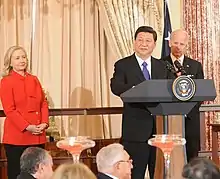
A Chinese nationalist,[182] Xi has reportedly taken a hard-line on security issues as well as foreign affairs, projecting a more nationalistic and assertive China on the world stage.[182] His political program calls for a China more united and confident of its own value system and political structure.[183]
Under Xi, China has also taken a more critical stance on North Korea, while improving relationships with South Korea.[184] China–Japan relations have soured under Xi's administration; the most thorny issue between the two countries remains the dispute over the Senkaku islands, which China calls Diaoyu. In response to Japan's continued robust stance on the issue, China declared an Air Defense Identification Zone in November 2013.[185]
Xi has called China–United States relations in the contemporary world a "new type of great-power relations", a phrase the Obama administration had been reluctant to embrace.[186] Under his administration the Strategic and Economic Dialogue that began under Hu Jintao has continued. On China–U.S. relations, Xi said, "If [China and the United States] are in confrontation, it would surely spell disaster for both countries".[187] The U.S. has been critical of Chinese actions in the South China Sea.[186] In 2014, Chinese hackers compromised the computer system of the U.S. Office of Personnel Management,[188] resulting in the theft of approximately 22 million personnel records handled by the office.[189]
Xi has cultivated stronger relations with Russia, particularly in the wake of the Ukraine crisis of 2014. He seems to have developed a strong personal relationship with President Vladimir Putin. Both are viewed as strong leaders with a nationalist orientation who are not afraid to assert themselves against Western interests.[190] Xi attended the opening ceremonies of the 2014 Winter Olympics in Sochi. Under Xi, China signed a $400 billion gas deal with Russia; China has also become Russia's largest trading partner.[190]
.jpg.webp)
Xi has also indirectly spoken out critically on the U.S. "strategic pivot" to Asia.[191] Addressing a regional conference in Shanghai on 21 May 2014, he called on Asian countries to unite and forge a way together, rather than get involved with third party powers, seen as a reference to the United States. "Matters in Asia ultimately must be taken care of by Asians. Asia's problems ultimately must be resolved by Asians and Asia's security ultimately must be protected by Asians", he told the conference.[192] In November 2014, in a major policy address, Xi called for a decrease in the use of force, preferring dialogue and consultation to solve the current issues plaguing the relationship between China and its South East Asian neighbors.[193]
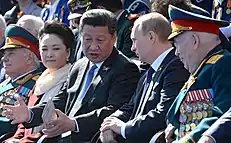
In April 2015, new satellite imagery revealed that China was rapidly constructing an airfield on Fiery Cross Reef in the Spratly Islands of the South China Sea.[194] In May 2015, U.S. Secretary of Defense Ash Carter warned the government of Xi Jinping to halt its rapid island-building in disputed territory in the South China Sea.[195] In spite of what seemed to be a tumultuous start to Xi Jinping's leadership vis-à-vis the United-States, on 13 May 2017 Xi said at the Belt and Road Forum in Beijing: "We should foster a new type of international relations featuring 'win-win cooperation', and we should forge a partnership of dialogue with no confrontation, and a partnership of friendship rather than alliance. All countries should respect each other's sovereignty, dignity and territorial integrity; respect each other's development path and its social systems, and respect each other's core interests and major concerns... What we hope to create is a big family of harmonious coexistence.”[196]
.jpg.webp)
Starting in 2017, China's relationship with South Korea soured over the THAAD purchase of the latter[197] while China's relations with North Korea increased because of meetings between Xi and North Korean leader Kim Jong-un.[198] At the G20 meeting in Japan, Xi called for a "timely easing" of sanctions imposed on North Korea.[199]
Relations with the U.S. soured after Donald Trump became president in 2016.[200] Since 2018, U.S. and China have been engaged in an escalating trade war.[201]
On 4 June 2019, Xi told the Russian news agency TASS that he was "worried" about the current tensions between the U.S. and Iran.[202] He later told his Iranian counterpart Hassan Rouhani during an SCO meeting that China would promote ties with Iran regardless of developments from the Gulf of Oman incident.[203]
.jpg.webp)
In the 2019, the Pew Research Center made a survey on attitude to Xi Jinping among six-country medians based on Australia, India, Indonesia, Japan, Philippines and South Korea. The survey indicated that a median 29% have confidence in Xi Jinping to do the right thing regarding world affairs, meanwhile a median of 45% have no confidence. These number are almost same with those of North Korean leader Kim Jong Un (23% confidence, 53% no confidence).[204]
Foreign trips as paramount leader
Xi made his first foreign trip as China's paramount leader to Russia on 22 March 2013, about a week after he assumed the presidency. He met with President Vladimir Putin and the two leaders discussed trade and energy issues. He then went on to Tanzania, South Africa (where he attended the BRICS summit in Durban), and the Republic of the Congo.[205] Xi visited the United States at Sunnylands Estate in California in a 'shirtsleeves summit' with U.S. President Barack Obama in June 2013, although this was not considered a formal state visit.[206] In October 2013 Xi attended the APEC Summit in Bali, Indonesia.
In March 2014 Xi made a trip to Western Europe visiting the Netherlands, where he attended the Nuclear Security Summit in The Hague, followed by visits to France, Germany and Belgium.[207] He made a state visit to South Korea on 4 July 2014 and met with South Korean President Park Geun-hye.[208] Between 14 and 23 July, Xi attended the BRICS leaders' summit in Brazil and visited Argentina, Venezuela, and Cuba.[209]
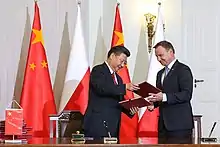
Xi went on an official state visit to India and met with Indian Prime Minister Narendra Modi in September 2014; he visited New Delhi and also went to Modi's hometown in the state of Gujarat.[210] He went on a state visit to Australia and met with Prime Minister Tony Abbott in November 2014,[211] followed by a visit to the island nation of Fiji.[212] Xi visited Pakistan in April 2015, signing a series of infrastructure deals worth $45 billion related to the China–Pakistan Economic Corridor. During his visit, Pakistan's highest civilian award, the Nishan-e-Pakistan, was conferred upon him.[213] He then headed to Jakarta and Bandung, Indonesia, to attend the Afro-Asian Leaders Summit and the 60th Anniversary events of the Bandung Conference.[214] Xi visited Russia and was the guest-of-honour of Russian President Vladimir Putin at the 2015 Moscow Victory Day Parade to mark the 70th Anniversary of the victory of the allies in Europe. At the parade, Xi and his wife Peng Liyuan sat next to Putin. On the same trip Xi also visited Kazakhstan and met with that country's president Nursultan Nazarbayev, and also met Alexander Lukashenko in Belarus.[215]
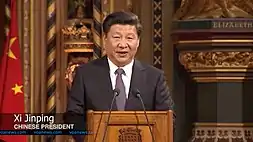
In September 2015, Xi made his first state visit to the United States.[216][217][218] In October 2015, he made a state visit to the United Kingdom, the first by a Chinese leader in a decade.[219] This followed a visit to China in March 2015 by the Duke of Cambridge. During the state visit, Xi met Queen Elizabeth II, British Prime Minister David Cameron and other dignitaries. Increased customs, trade and research collaborations between China and the UK were discussed, but more informal events also took place including a visit to Manchester City's football academy.[220]
In March 2016, Xi visited the Czech Republic on his way to United States. In Prague, he met with the Czech president, prime minister and other representatives to promote relations and economic cooperation between the Czech Republic and the People's Republic of China.[221] His visit was met by a considerable number of protests by Czechs.[222]
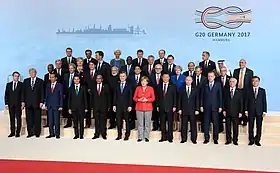
In January 2017, Xi became the first Chinese paramount leader to plan to attend the World Economic Forum in Davos.[223] On 17 January, Xi addressed the forum in a high-profile keynote, addressing globalization, the global trade agenda, and China's rising place in the world's economy and international governance; he made a series of pledges about China's defense of "economic globalization" and climate change accords.[223][224][225] Premier Li Keqiang attended the forum in 2015 and Vice-President Li Yuanchao did so in 2016. During the three-day state visit to the country in 2017 Xi also visited the World Health Organization, the United Nations and the International Olympic Committee.[225]
On 20 June 2019, Xi Jinping visited Pyongyang, becoming the first Chinese leader to visit North Korea since his predecessor Hu Jintao's visit in 2004.[226] In 27 June, he attended the G20 summit in Osaka, becoming the first Chinese leader to visit Japan since 2010.[227]
Belt and Road Initiative
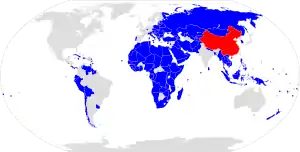
The Belt and Road Initiative (BRI) was unveiled by Xi in September and October 2013 during visits to Kazakhstan and Indonesia,[228] and was thereafter promoted by Premier Li Keqiang during state visits to Asia and Europe. Xi made the announcement for the initiative while in Astana, Kazakhstan, and called it a "golden opportunity".[229] BRI has been called Xi's "signature project", involving numerous infrastructure development and investment projects throughout Asia, Europe, Africa, and the Americas.[230] BRI was added to the CCP Constitution at the closing session of the 19th Party Congress on 24 October 2017,[231] further elevating its importance.[232]
Human rights
According to the Human Rights Watch, Xi has "started a broad and sustained offensive on human rights" since he became leader in 2012.[233] The HRW also said that repression in China is "at its worst level since the Tiananmen Square massacre."[234] Since taking power, Xi has cracked down on grassroots activism, with hundreds being detained.[235] He presided over the 709 crackdown on 9 July 2015, which saw more than 200 lawyers, legal assistants and human rights activists being detained.[236] His term has seen the arrest and imprisonment of activists such as Xu Zhiyong, as well as numerous others who identified with the New Citizens' Movement. Prominent legal activist Pu Zhiqiang of the Weiquan movement was also arrested and detained.[237]
In 2017, the local government of the Jiangxi province told Christians to replace their pictures of Jesus with Xi Jinping as part of a general campaign on unofficial churches in the country.[238][239][240] According to local social media, officials "transformed them from believing in religion to believing in the party".[238] According to activists, "Xi is waging the most severe systematic suppression of Christianity in the country since religious freedom was written into the Chinese constitution in 1982", and according to pastors and a group that monitors religion in China, has involved "destroying crosses, burning bibles, shutting churches and ordering followers to sign papers renouncing their faith".[241]
Following several terrorist attacks in Xinjiang in 2013 and 2014, Xi launched the "people's war on terror" in 2014, which involved mass detention, and surveillance of ethnic Uyghurs there.[242][243] Xi made an inspection tour in Xinjiang between April 27 and April 30 in 2014.[244][245] As of 2019, China is holding one million ethnic Uyghurs in internment camps in Xinjiang.[246] Various human rights groups and former inmates have described the camps as “concentration camps”, where Uyghurs and other minorities have been forcibly assimilated into China's majority ethnic Han society.[247] Internal Chinese government documents leaked to the press in November 2019 showed that Xi personally ordered a security crackdown in Xinjiang, saying that the party must show “absolutely no mercy” and that officials use all the “weapons of the people's democratic dictatorship” to suppress those “infected with the virus of extremism”.[243][248] The documents also showed that Xi repeatedly discussed about Islamic extremism in his speeches, likening it to a "virus" or a "drug" which could be only addressed by "a period of painful, interventionary treatment.”[243] However, he also warned against the discrimination against Uyghurs and rejected proposals to eradicate Islam in China completely, calling that kind of viewpoint "biased, even wrong".[243]
On 8 July 2019, 22 countries signed a statement to the UN's High Commissioner for Human Rights in which they called for an end to mass detentions in China and expressed concerns over widespread surveillance and repression in Xinjiang.[249][250][251]
In response, 50 countries signed a joint letter to the UNHRC commending China's "remarkable achievements in the field of human rights" under Xi Jinping, claiming "Now safety and security has returned to Xinjiang and the fundamental human rights of people of all ethnic groups there are safeguarded." They also criticized the practice of "politicizing human rights issues".[252][253][249]
In October 2019, 23 countries issued a joint statement to the UN urging China to "uphold its national and international obligations and commitments to respect human rights".[254][255]
In response, 54 countries issued a joint statement supporting China's Xinjiang policies. The statement "spoke positively of the results of counter-terrorism and de-radicalization measures in Xinjiang and noted that these measures have effectively safeguarded the basic human rights of people of all ethnic groups."[255][256]
In October 2020, Axios reported that more countries at the UN joined the condemnation of China over Xinjiang abuses. The total number of countries that denounced China increased to 39, while the total number of countries that defended China decreased to 45. Notably, 16 countries that defended China in 2019 did not do so in 2020.[257]
COVID-19 pandemic
German newspaper Der Spiegel reported that Xi Jinping pressured Tedros Adhanom, director-general of the World Health Organization in January 2020 to hold off on issuing a global warning about the coronavirus outbreak. The report published over the weekend said Xi urged the WHO chief to “delay a global warning” about the pandemic and hold back information on human-to-human transmission of the virus, but WHO denied German allegations.[258]
On 22 September 2020, a Chinese billionaire, Ren Zhiqiang was sentenced to jail for 18 years on corruption charges. The former real-estate tycoon had disappeared in March, after writing an article online, criticizing Xi Jinping's handling of the COVID-19 pandemic.[259]
Environmental policy
In September 2020 Xi Jinping announced that China will "strengthen its 2030 climate target (NDC), peak emissions before 2030 and aim to achieve carbon neutrality before 2060".[260] According to Climate Action Tracker if it will be accomplished it will lower the expected rise in global temperature by 0.2 - 0.3 degrees - "the biggest single reduction ever estimated by the Climate Action Tracker".[261] The announcement was made in the United Nations General Assembly. Xi Jinping mentioned the link between the COVID-19 pandemic and nature destruction as one of the reasons to the decision, saying that "Humankind can no longer afford to ignore the repeated warnings of nature,"[262] In the 27 of September, China's climate scientists presented a detailed plan how to achieve the target.[263]
Political positions
Elizabeth C. Economy argued in 2018:
- What makes Xi's revolution distinctive is the strategy he has pursued: the dramatic centralization of authority under his personal leadership; the intensified penetration of society by the state; the creation of a virtual wall of regulations and restrictions that more tightly control the flow of ideas, culture and capital into and out of the country; and the significant projection of Chinese power. It represents a reassertion of the state in Chinese political and economic life at home, and a more ambitious and expansive role for China abroad.[264]
Chinese Dream
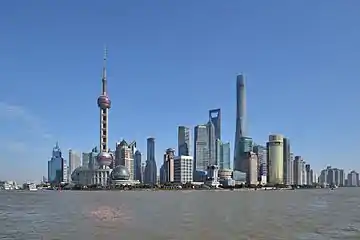
Xi and Communist Party ideologues coined the phrase "Chinese Dream" to describe his overarching plans for China as its leader. Xi first used the phrase during a high-profile visit to the National Museum of China on 29 November 2012, where he and his Standing Committee colleagues were attending a "national revival" exhibition. Since then, the phrase has become the signature political slogan of the Xi era.[265][266] Since 2013, the phrase has emerged as the distinctive quasi-official ideology of the party leadership under Xi, much as the "Scientific Outlook on Development" was for Hu Jintao and the "Three Represents" was for Jiang Zemin. The origin of the term "Chinese Dream" is unclear. While the phrase has been used before by journalists and scholars,[267] some publications have posited the term likely drew its inspiration from the concept of the American Dream.[268] The Economist noted the abstract and seemingly accessible nature of the concept with no specific overarching policy stipulations may be a deliberate departure from the jargon-heavy ideologies of his predecessors.[269] While the Chinese Dream was originally interpreted as an extension of the American Dream, which emphasises individual self-improvement and opportunity,[269] the slogan's use in official settings since 2013 has taken on a noticeably more nationalistic character, with official pronouncements of the "Dream" being consistently linked with the phrase "great revival of the Chinese nation".[note 5]
Cultural revival
As communist ideology plays a less central role in the lives of the masses in the People's Republic of China, top political leaders of the Chinese Communist Party such as Xi continue the rehabilitation of ancient Chinese philosophical figures like Han Fei into the mainstream of Chinese thought alongside Confucianism, both of which Xi sees as relevant. At a meeting with other officials in 2013, he quoted Confucius, saying "he who rules by virtue is like the Pole Star, it maintains its place, and the multitude of stars pay homage." While visiting Shandong, the birthplace of Confucius, in November, he told scholars that the Western world was "suffering a crisis of confidence" and that the CCP has been "the loyal inheritor and promoter of China's outstanding traditional culture."[270]
Xi's leadership has been characterised by a resurgence of the ancient political philosophy Legalism.[271][272][273] The trend under Xi represents a fundamental shift from foreign imports such as Communism and limited Westernisation to a greater reliance on political thoughts and practices rooted in China's own traditions.[271] Han Fei gained new prominence with favourable citations; one sentence of Han Fei's that Xi quoted appeared thousands of times in official Chinese media at the local, provincial, and national levels.[273]
Xi has also overseen a revival of traditional Chinese culture, breaking apart from CCP's path which had often attacked it.[274] He has called traditional culture the "soul" of the nation and the "foundation" of the CCP's culture.[275] Hanfu, the traditional dress of Han Chinese, has seen a revival under him.[276]
Xi Jinping Thought
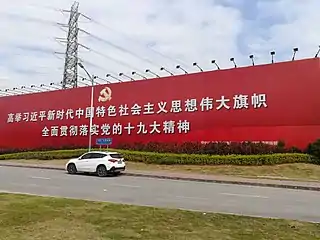
In September 2017, the Communist Party Central Committee decided that Xi's political philosophies, generally referred to as "Xi Jinping Thought on Socialism with Chinese Characteristics for a New Era", would become part of the Party Constitution.[277][278] Xi first made mention of the "Thought on Socialism with Chinese Characteristics for a New Era" in his opening day speech delivered to the 19th Party Congress in October 2017. His Politburo Standing Committee colleagues, in their own reviews of Xi's keynote address at the Congress, prepended the name "Xi Jinping" in front of "Thought".[279] On 24 October 2017, at its closing session, the 19th Party Congress approved the incorporation of Xi Jinping Thought into the Constitution of the Chinese Communist Party.[132][280]
Xi himself has described the Thought as part of the broad framework created around Socialism with Chinese Characteristics, a term coined by Deng Xiaoping that places China in the "primary stage of socialism". In official party documentation and pronouncements by Xi's colleagues, the Thought is said to be a continuation of Marxism–Leninism, Mao Zedong Thought, Deng Xiaoping Theory, the "Three Represents", and the Scientific Development Perspective, as part of a series of guiding ideologies that embody "Marxism adopted to Chinese conditions" and contemporary considerations.[279]
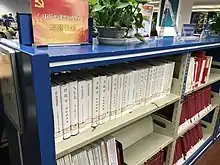
The concepts and context behind Xi Jinping Thought are elaborated in Xi's The Governance of China book series, published by the Foreign Languages Press for an international audience. Volume one was published in September 2014, followed by volume two in November 2017.[281]
An app for teaching “Xi Jinping Thought” has become the most popular smartphone app in China, as the country's ruling Communist Party launched a new campaign that calls on its cadres to immerse themselves in the political doctrine every day. Xuexi Qiangguo, which translates to “Study powerful country”, is now the most downloaded item on Apple's domestic App Store, surpassing in demand social media apps such as WeChat and TikTok – known as Weixin and Douyin, respectively, in mainland China.[282]
Role of the Communist Party
In Xi's view, the Communist Party is the legitimate, constitutionally-sanctioned ruling party of China, and that the party derives this legitimacy through advancing the Mao-style "mass line Campaign"; that is the party represents the interests of the overwhelming majority of ordinary people. In this vein, Xi called for officials to practise self-criticism in order to appear less corrupt and more popular among the people.[283][284][285]
Xi's position has been described as preferring highly centralized political power as a means to direct large-scale economic restructuring.[237] Xi believes that China should be "following its own path" and that a strong authoritarian government is an integral part of the "China model", operating on a "core socialist value system", which has been interpreted as China's alternative to Western values. However, Xi and his colleagues acknowledge the challenges to the legitimacy of Communist rule, particularly corruption by party officials. The answer, according to Xi's programme, is two-fold: strengthen the party from within, by streamlining strict party discipline and initiating a large anti-corruption campaign to remove unsavoury elements from within the party, and re-instituting the Mass Line Campaign externally to make party officials better understand and serve the needs of ordinary people. Xi believes that, just as the party must be at the apex of political control of the state, the party's central authorities (i.e., the Politburo, PSC, or himself as general secretary) must exercise full and direct political control of all party activities.[286]
Hong Kong and Taiwan
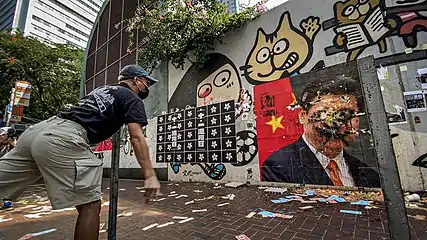
Hong Kong
Xi has supported and pursued a greater economic integration of Hong Kong to mainland China through projects such as the Hong Kong–Zhuhai–Macau Bridge.[287] He has pushed for the Greater Bay Area project, which aims to integrate Hong Kong, Macau, and nine other cities in Guangdong.[287] Xi's push for greater integration has created fears of decreasing freedoms in Hong Kong.[288]
Xi has supported the Hong Kong Government and incumbent Chief Executive Carrie Lam against the protesters in the 2019–20 Hong Kong protests.[289] He has defended the Hong Kong police's use of force, saying that "We sternly support the Hong Kong police to take forceful actions in enforcing the law, and the Hong Kong judiciary to punish in accordance with the law those who have committed violent crimes."[290] While visiting Macau on 20 December 2019 as part of the 20th anniversary of its return to China, Xi warned of "foreign forces" interfering in Hong Kong and Macau,[291] while also hinting that Macau could be a model for Hong Kong to follow.[292]
Taiwan
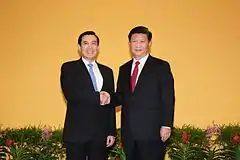
The 2015 meeting between Xi and Taiwanese President Ma Ying-jeou marked the first time the political leaders of both sides of the Taiwan Strait have met since the end of the Chinese Civil War in 1950.[293] Xi said that China and Taiwan are "one family" that can't be pulled apart.[294]
In the 19th Party Congress held in 2017, Xi reaffirmed six of the nine principles that had been affirmed continuously since the 16th Party Congress in 2002, with the notable exception of "Placing hopes on the Taiwan people as a force to help bring about unification".[295] According to the Brookings Institution, Xi used stronger language on potential Taiwan independence than his predecessors towards previous DPP governments in Taiwan.[295] In March 2018, Xi said that Taiwan would face the "punishment of history" for any attempts at separatism.[296]
In January 2019, Xi Jinping called on Taiwan to reject its formal independence from China, saying: "We make no promise to renounce the use of force and reserve the option of taking all necessary means." Those options, he said, could be used against “external interference”. Xi also said that they "are willing to create broad space for peaceful reunification, but will leave no room for any form of separatist activities,"[297][298] Tsai Ing-Wen responded to the speech by saying Taiwan would not accept a one country, two systems arrangement with the mainland, while stressing for the need of all cross-strait negotiations to be on a government-to-government basis.[299]
Personal life
Family
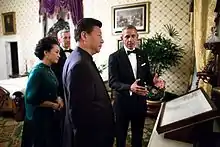
Xi married Ke Lingling, the daughter of Ke Hua, China's ambassador to the United Kingdom in the early 1980s. They divorced within a few years.[300] The two were said to fight "almost every day", and after the divorce Ke moved to England.[44]
Xi married the prominent Chinese folk singer Peng Liyuan in 1987.[301] Xi and Peng were introduced by friends as many Chinese couples were in the 1980s. Xi was reputedly academic during their courtship, inquiring about singing techniques.[302] Peng Liyuan, a household name in China, was better known to the public than Xi until his political elevation. The couple frequently lived apart due largely to their separate professional lives. Peng has played a much more visible role as China's "first lady" compared to her predecessors; for example, Peng hosted U.S. First Lady Michelle Obama on her high-profile visit to China in March 2014.[303] Xi and Peng have a daughter named Xi Mingze, who graduated from Harvard University in the spring of 2015. While at Harvard, she used a pseudonym and studied Psychology and English.[304] Xi's family has a home in Jade Spring Hill, a garden and residential area in north-western Beijing run by the Central Military Commission.[305]
In June 2012, Bloomberg News reported that members of Xi's extended family have substantial business interests, although there was no evidence he had intervened to assist them.[306] The Bloomberg website was blocked in mainland China in response to the article.[307] Since Xi embarked on an anti-corruption campaign, The New York Times reported members of his family were selling their corporate and real estate investments beginning in 2012.[308]
Relatives of highly placed Chinese officials, including seven current and former senior leaders of the Politburo of the Chinese Communist Party, have been named in the Panama Papers, including Deng Jiagui,[309] Xi's brother-in-law. Deng had two shell companies in the British Virgin Islands while Xi was a member of the Politburo Standing Committee, but they were dormant by the time Xi became general secretary of the Communist Party in November 2012.[310]
Personality
Peng described Xi as hardworking and down-to-earth: "When he comes home, I've never felt as if there's some leader in the house. In my eyes, he's just my husband."[311] Xi was described in a 2011 The Washington Post article by those who know him as "pragmatic, serious, cautious, hard-working, down to earth and low-key". He was described as a good hand at problem solving and "seemingly uninterested in the trappings of high office".[312] He is known to love U.S. films such as Saving Private Ryan, The Departed and The Godfather.[313][314] He is also a fan of HBO television series Game of Thrones, watching a condensed version due to tight schedules.[315] He also praised the independent film-maker Jia Zhangke.[316] He also likes playing football, mountain climbing, walking, volleyball and swimming. He once said that he would swim one kilometre and walk every day as long as there was time.[317][318]
Public image
Xi Jinping is widely popular in China.[319][320] According to a 2014 poll co-sponsored by the Harvard Kennedy School's Ash Center for Democratic Governance and Innovation, Xi ranked 9 out of 10 in domestic approval ratings.[321] A YouGov poll released in July 2019 found that 22% of Chinese people list Xi as the person they admire the most.[322]
In 2017, The Economist named him the most powerful person in the world.[323] In 2018, Forbes ranked him as the most powerful and influential person in the world, replacing Russian President Vladimir Putin who had been ranked so for five consecutive years.[324]
Honours
- Foreign Honours

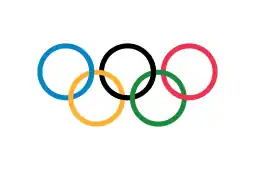 International Olympic Committee: The Golden Olympic order (19 November 2013)[325]
International Olympic Committee: The Golden Olympic order (19 November 2013)[325]
.svg.png.webp) Belgium: Grand Cordon of the Order of Leopold (30 March 2014)[326]
Belgium: Grand Cordon of the Order of Leopold (30 March 2014)[326]
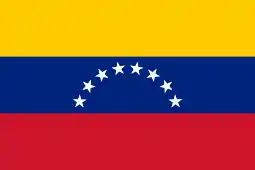 Venezuela: Grand Cordon of the Order of the Liberator (20 July 2014)[327]
Venezuela: Grand Cordon of the Order of the Liberator (20 July 2014)[327]
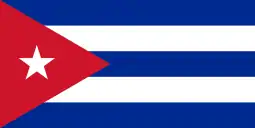 Cuba: Order of José Martí (22 July 2014)[328]
Cuba: Order of José Martí (22 July 2014)[328]
 Pakistan: Nishan-e-Pakistan (21 April 2015)[329]
Pakistan: Nishan-e-Pakistan (21 April 2015)[329]
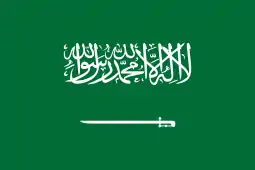 Saudi Arabia: Order of Abdulaziz al Saud (19 January 2016)[330]
Saudi Arabia: Order of Abdulaziz al Saud (19 January 2016)[330]
 Serbia: Order of the Republic of Serbia of the first order (18 June 2016)[331]
Serbia: Order of the Republic of Serbia of the first order (18 June 2016)[331]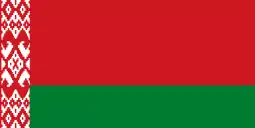 Belarus: Order for Promotion of Peace and Friendship (29 September 2016)[332]
Belarus: Order for Promotion of Peace and Friendship (29 September 2016)[332]_-_ribbon_bar.png.webp)
 Peru: Medal of Honor (21 November 2016)
Peru: Medal of Honor (21 November 2016)
 Palestine: Grand Collar of the State of Palestine (18 July 2017)[333]
Palestine: Grand Collar of the State of Palestine (18 July 2017)[333]
 Russia: Knight of the Order of Saint Andrew (3 July 2017)[334]
Russia: Knight of the Order of Saint Andrew (3 July 2017)[334]
 United Arab Emirates: Order of Zayed (20 July 2018)[335]
United Arab Emirates: Order of Zayed (20 July 2018)[335]
 Argentina: Collar of the Order of the Liberator General San Martin (2 December 2018)
Argentina: Collar of the Order of the Liberator General San Martin (2 December 2018)
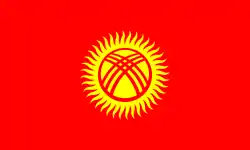 Kyrgyzstan: Order of Manas (13 June 2019)[336]
Kyrgyzstan: Order of Manas (13 June 2019)[336]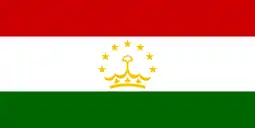 Tajikistan: Order of the Crown (15 June 2019)[337]
Tajikistan: Order of the Crown (15 June 2019)[337]
- Key to the City

 Muscatine, Iowa, U.S. (26 April 1985)[338][339]
Muscatine, Iowa, U.S. (26 April 1985)[338][339]
 Muscatine, Iowa, U.S. (14 February 2012)[338]
Muscatine, Iowa, U.S. (14 February 2012)[338]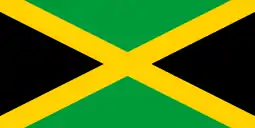 Montego Bay, Jamaica (13 February 2009)[73]
Montego Bay, Jamaica (13 February 2009)[73]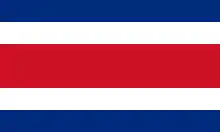
.svg.png.webp) San José, Costa Rica (3 June 2013)
San José, Costa Rica (3 June 2013)
 Mexico City, Mexico (5 June 2013)
Mexico City, Mexico (5 June 2013)
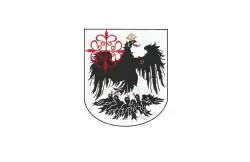 Buenos Aires, Argentina (19 July 2014)
Buenos Aires, Argentina (19 July 2014)
 Prague, Czech Republic (29 March 2016)
Prague, Czech Republic (29 March 2016)
 Madrid, Spain (28 November 2018)
Madrid, Spain (28 November 2018)
Works
Notes
- The bachelor degree offered in Tsinghua University on chemical engineering is a Bachelor of Engineering but not a B.Sc. which is attained in some universities.
- Liu Yandong, Wang Qishan, and Deng Pufang (Deng Xiaoping's son) all placed among the bottom of the alternate member list. Like Xi, all three were seen as "princelings". Bo Xilai was not elected to the Central Committee at all; that is, Bo placed lower in the vote count than Xi.
- Original simplified Chinese: 在国际金融风暴中,中国能基本解决13亿人口吃饭的问题,已经是对全人类最伟大的贡献; traditional Chinese: 在國際金融風暴中,中國能基本解決13億人口吃飯的問題,已經是對全人類最偉大的貢獻
- Original: simplified Chinese: 有些吃饱没事干的外国人,对我们的事情指手画脚。中国一不输出革命,二不输出饥饿和贫困,三不折腾你们,还有什么好说的?; traditional Chinese: 有些吃飽沒事干的外國人,對我們的事情指手畫腳。中國一不輸出革命,二不輸出飢餓和貧困,三不折騰你們,還有什麽好說的?
- Chinese: 中华民族伟大复兴, which can also be translated as the "Great Renaissance of the Chinese nation" or the "Great revival of the Chinese people".
References
Citations
- "Association for Conversation of Hong Kong Indigenous Languages Online Dictionary". hkilang.org. 1 July 2015. Archived from the original on 1 July 2015. Retrieved 12 September 2019.
- "Journal of Current Chinese Affairs" (PDF). giga-hamburg.de. May 2009. Archived (PDF) from the original on 17 February 2012. Retrieved 20 October 2010.
- Choi, Chi-yuk; Jun, Mai (18 September 2017). "Xi Jinping's political thought will be added to Chinese Communist Party constitution, but will his name be next to it?". South China Morning Post. Retrieved 22 September 2017.
- "The power of Xi Jinping". The Economist. 18 September 2014. Archived from the original on 7 November 2017. Retrieved 20 September 2017.
- Jiayang, Fan; Taisu, Zhang; Ying, Zhu (8 March 2016). "Behind the Personality Cult of Xi Jinping". Foreign Policy. Archived from the original on 26 July 2019. Retrieved 26 July 2019.
- Brady, Anne-Marie (2015). "China's Foreign Propaganda Machine". Journal of Democracy. 26 (4): 51–59. doi:10.1353/jod.2015.0056. ISSN 1086-3214. S2CID 146531927.
- Amako, Satoshi (2 January 2018). "China's authoritarian path to development: is democratization possible?, by Liang Tang, Abingdon, Routledge, 2017, 263pp., ISBN: 978-1-138-01647-7". Journal of Contemporary East Asia Studies. 7 (1): 81–83. doi:10.1080/24761028.2018.1483700. ISSN 2476-1028.
- Tung, Hans H. (2019). Economic Growth and Endogenous Authoritarian Institutions in Post-Reform China. Palgrave Macmillan.
- Howell, Jude; Pringle, Tim (2019). "Shades of Authoritarianism and State–Labour Relations in China" (PDF). British Journal of Industrial Relations. 57 (2): 223–246. doi:10.1111/bjir.12436. ISSN 1467-8543. S2CID 158485609.
- Düben, Björn Alexander (3 March 2020). "Xi Jinping and the End of Chinese Exceptionalism". Problems of Post-Communism. 67 (2): 111–128. doi:10.1080/10758216.2018.1535274. ISSN 1075-8216. S2CID 158657283.
- Brady, Anne-Marie (2015). "China's Foreign Propaganda Machine". Journal of Democracy. 26 (4): 51–59. doi:10.1353/jod.2015.0056. ISSN 1086-3214. S2CID 146531927.
- Amako, Satoshi (2 January 2018). "China's authoritarian path to development: is democratization possible?, by Liang Tang, Abingdon, Routledge, 2017, 263pp., ISBN: 978-1-138-01647-7". Journal of Contemporary East Asia Studies. 7 (1): 81–83. doi:10.1080/24761028.2018.1483700. ISSN 2476-1028.
- Tung, Hans H. (2019). Economic Growth and Endogenous Authoritarian Institutions in Post-Reform China. Palgrave Macmillan.
- Howell, Jude; Pringle, Tim (2019). "Shades of Authoritarianism and State–Labour Relations in China" (PDF). British Journal of Industrial Relations. 57 (2): 223–246. doi:10.1111/bjir.12436. ISSN 1467-8543. S2CID 158485609.
- Düben, Björn Alexander (3 March 2020). "Xi Jinping and the End of Chinese Exceptionalism". Problems of Post-Communism. 67 (2): 111–128. doi:10.1080/10758216.2018.1535274. ISSN 1075-8216. S2CID 158657283.
- Phillips, Tom (26 February 2018). "'Dictator for life': Xi Jinping's power grab condemned as step towards tyranny". The Guardian. Retrieved 12 August 2019.
- Anderlini, Jamil (11 October 2017). "Under Xi Jinping, China is turning back to dictatorship". Financial Times. Retrieved 12 August 2019.
- Radchenko, Sergey (5 March 2018). "Dictatorship nearly destroyed China once. Will it do so again?". The Washington Post. Retrieved 12 August 2019.
- Carrico, Kevin (2 April 2018). "A deepening dictatorship promises a grim future for China". East Asia Forum. Retrieved 12 August 2019.
- Stelzer, Irwin (4 March 2018). "Emasculate America: The dictator's plan for world domination". The Times. Retrieved 12 August 2019.
- "Kim Jong Un entertains Xi Jinping at home". The Economist. 21 June 2019. ISSN 0013-0613. Retrieved 17 August 2019.
It was Mr Xi’s first visit to North Korea since he and Mr Kim took the helm of their respective countries... It is not known what precisely the two dictators discussed once they retired to a guest house for talks.
- Mair, Victor H. (28 February 2018). "China's war on words show Xi Jinping is a dictator for life | Opinion". Newsweek. Retrieved 17 August 2019.
- Hein, Matthias (26 February 2018). "Opinion: Xi Jinping – Today's chairman, tomorrow's dictator?". Deutsche Welle. Retrieved 17 August 2019.
- Cohen, Jerome A. (28 February 2018). "China Is Likely to Enter Another Long Period of Severe Dictatorship". Council on Foreign Relations. Retrieved 17 August 2019.
- Patten, Chris (30 July 2019). "Great Countries, Bad Leaders". Project Syndicate. Retrieved 17 August 2019.
Moreover, Xi is deploying cutting-edge technology to reinforce his dictatorship.
- Feldman, Noah (27 February 2018). "China Now Faces the Downsides of Dictatorship". Bloomberg. Retrieved 17 August 2019.
- Tisdall, Simon (23 November 2018). "The Chinese export we really should be worried about: repression". The Guardian. ISSN 0261-3077. Retrieved 17 August 2019.
What is different, and underappreciated in the west, is the way Xi is inexorably and single-mindedly expanding draconian systems of social control centred on the Communist party and the de facto dictatorship of one man: himself.
- "Profile: Chinese Vice President Xi Jinping". Radio Free Europe/Radio Liberty. 7 November 2012. Archived from the original on 19 October 2013. Retrieved 26 August 2013.
- 與丈夫習仲勛相伴58年 齊心:這輩子無比幸福 [With her husband Xi Zhongxun for 58 years: very happy in this life]. Xinhua News Agency (in Chinese). 28 April 2009. Archived from the original on 28 January 2013. Retrieved 18 March 2013.
- Xu, Xinyi (27 May 2013). 習近平"家風"揭秘 齊心自述與習仲勛婚姻往事 [Xi Jinping's "family traditions" are unmasked: Qi Xin's autobiographical account of her marriage to Xi Zhongxun]. People's Daily (in Chinese). Archived from the original on 28 April 2017. Retrieved 27 April 2017.
- Fangqin, Sun (16 November 2012). 本報獨家探訪河南鄧州習營村 [This Newspaper's Exclusive Visit To Xiying Village, Dengzhou County, Henan]. Wen Wei Po (in Chinese). Archived from the original on 23 January 2013. Retrieved 15 November 2012.
- Li, Cheng. "Xi Jinping's Inner Circle (Part 2: Friends from Xi's Formative Years)" (PDF). Hoover Institution. pp. 6–22. Retrieved 15 July 2020.
- Takahashi, Tetsushi (1 June 2002). "Connecting the dots of the Hong Kong law and veneration of Xi". Nikkei Shimbun. Retrieved 23 October 2020.
- Osnos, Evan (30 March 2015). "Born Red". New Yorker. Retrieved 23 October 2020. - The article refers to the Beijing Bayi School as the "August 1st School". Based on the timeline presented in the article, Xi went to Beijing Bayi in the 1960s.
- Tisdall, Simon (29 December 2019). "The power behind the thrones: 10 political movers and shakers who will shape 2020". The Guardian. ISSN 0029-7712. Retrieved 16 January 2020.
- Wei, Lingling (27 February 2018). "Who Is 'Uncle He?' The Man in Charge of China's Economy". The Wall Street Journal. Retrieved 16 January 2020.
- Bouée 2010, p. 93.
- Buckley, Chris; Tatlow, Didi Kirsten (24 September 2015). "Cultural Revolution Shaped Xi Jinping, From Schoolboy to Survivor". The New York Times. Archived from the original on 5 March 2018. Retrieved 6 March 2018.
- 不忘初心:是什么造就了今天的习主席? [What Were His Original Intentions? The President Xi of Today]. Youku (in Chinese). 30 January 2018. Archived from the original on 30 January 2018. Retrieved 30 January 2018.
- Lim, Louisa (9 November 2012). "For China's Rising Leader, A Cave Was Once Home". NPR. Archived from the original on 16 June 2018. Retrieved 27 October 2018.
- Demick, Barbara; Pierson, David (14 February 2012). "China's political star Xi Jinping is a study in contrasts". Toronto Star. Archived from the original on 13 October 2017. Retrieved 24 October 2017.
- Page, Jeremy (23 December 2020). "How the U.S. Misread China's Xi: Hoping for a Globalist, It Got an Autocrat". The Wall Street Journal. ISSN 0099-9660. Retrieved 25 December 2020.
- Osnos, Evan (30 March 2015). "Born Red". The New Yorker. Archived from the original on 4 October 2019. Retrieved 11 September 2019.
- ""The Current" – Wednesday February 28, 2018 Full Text Transcript". CBC Radio. 28 February 2018. Archived from the original on 24 March 2018. Retrieved 28 October 2018.
- Ranade, Jayadva (25 October 2010). "China's Next Chairman – Xi Jinping". Centre for Air Power Studies. Archived from the original on 24 July 2013. Retrieved 27 May 2012.
- Simon & Cong 2009, pp. 28–29.
- Dvorchak, Gary (24 September 2015). "President Xi Slept Here: How a Trip to Iowa in 1985 Changed U.S.-China Relations". The Street. Archived from the original on 18 April 2016. Retrieved 7 September 2019.
- "Xi Jinping". GlobalSecurity.org. Archived from the original on 5 December 2011. Retrieved 27 May 2012.
- "Xi Jinping: From graft-fighting governor to China's most powerful leader since Mao Zedong". The Straits Times. 11 March 2018. Archived from the original on 18 August 2019. Retrieved 18 August 2019.
- 中共十五大习近平位列候补委员最后一名为何 [Why Is Xi Jinping, At the 15th CCP National Congress, Being Waited On To Fill The Last Committee Member Position?]. Canyu.org (in Chinese). 22 April 2011. Archived from the original on 12 June 2018. Retrieved 7 September 2019.
- "Xi Jinping -- Politburo Standing Committee member of CPC Central Committee". People's Daily. 22 October 2007. Archived from the original on 30 June 2015. Retrieved 30 October 2019.
- Watts, Jonathan (26 October 2007). "Most corrupt officials are from poor families but Chinese royals have a spirit that is not dominated by money". The Guardian. London, England. Archived from the original on 1 September 2013. Retrieved 11 June 2008.
- Tiezzi, Shannon (4 November 2014). "From Fujian, China's Xi Offers Economic Olive Branch to Taiwan". The Diplomat. Archived from the original on 10 June 2016. Retrieved 17 March 2016.
- Yu, Xiao (18 February 2000). "Fujian leaders face Beijing top brass". South China Morning Post. Archived from the original on 29 October 2018. Retrieved 7 September 2019.
- Ho, Louise (25 October 2012). "Xi Jinping's time in Zhejiang: doing the business". South China Morning Post. Archived from the original on 29 April 2016. Retrieved 9 December 2019.
- Wang, Lei (25 December 2014). 习近平为官之道 拎着乌纱帽干事 [Xi Jinping's Governmental Path – Carries Official Administrative Posts]. Duowei News (in Chinese). Archived from the original on 3 February 2015. Retrieved 7 September 2019.
- 习近平任上海市委书记 韩正不再代理市委书记 [Xi Jinping is Secretary of Shanghai Municipal Party Committee – Han Zheng is No Longer Acting Party Secretary]. Sohu (in Chinese). 24 March 2007. Archived from the original on 16 October 2007. Retrieved 7 September 2019.
- "China new leaders: Xi Jinping heads line-up for politburo". BBC News. 15 November 2012. Archived from the original on 9 September 2019. Retrieved 25 August 2019.
- 从上海到北京 习近平贴身秘书只有钟绍军 [From Shanghai to Beijing, Zhong Shaojun Has Been Xi Jinping’s Only Personal Secretary]. Mingjing News (in Chinese). 11 July 2013. Archived from the original on 12 June 2018. Retrieved 12 September 2019.
- Lam 2015, p. 56.
- 新晋政治局常委:习近平 [Newly Appointed Member of Politburo Standing Committee: Xi Jinping]. Caijing (in Chinese). 22 October 2007. Archived from the original on 22 December 2015. Retrieved 12 September 2019.
- "Hu Jintao reelected Chinese president". China Daily. 15 March 2008. Archived from the original on 4 March 2016. Retrieved 8 September 2019.
- "Vice-President Xi Jinping to Visit DPRK, Mongolia, Saudi Arabia, Qatar and Yemen". Ministry of Foreign Affairs. 5 June 2008. Archived from the original on 23 July 2011. Retrieved 20 October 2010.
- Wines, Michael (9 March 2009). "China's Leaders See a Calendar Full of Anniversaries, and Trouble". The New York Times. ISSN 0362-4331. Archived from the original on 21 July 2016. Retrieved 8 September 2019.
- Anderlini, Jamil (20 July 2012). "Bo Xilai: power, death and politics". Financial Times. Retrieved 11 January 2020.
- Palmer, James (19 October 2017). "The Resistible Rise of Xi Jinping". Foreign Policy. Retrieved 11 January 2020.
- Ansfield, Jonathan (22 December 2007). "Xi Jinping: China's New Boss And The 'L' Word". Newsweek. Archived from the original on 30 March 2010. Retrieved 20 October 2010.
- Elegant, Simon (19 November 2007). "China's Nelson Mandela". Time. Archived from the original on 28 July 2009. Retrieved 8 September 2019.
- Elegant, Simon (15 March 2008). "China Appoints Xi Vice President, Heir Apparent to Hu". Bloomberg News. Retrieved 20 October 2010.
- Uren, David (5 October 2012). "Rudd seeks to pre-empt PM's China white paper with his own version". The Australian. Archived from the original on 22 November 2012. Retrieved 8 September 2019.
- "Chinese vice president arrives in Mexico for official visit". People's Daily. 10 February 2009. Retrieved 11 September 2019.
- "Chinese VP Receives Key to the City of Montego Bay". Jamaica Information Service. 15 February 2009. Archived from the original on 14 July 2019. Retrieved 7 September 2019.
- "Chinese vice president continues visit in Colombia". People's Daily. 17 February 2009. Retrieved 11 September 2019.
- Zhang, Xiang (18 February 2009). "Chinese VP praises friendly cooperation with Venezuela, Latin America". Government of China. Retrieved 11 September 2019.
- "Xi Jinping proposes efforts to boost cooperation with Brazil". China Daily. 20 February 2009. Archived from the original on 6 February 2011. Retrieved 11 September 2019.
- "Chinese vice president begins official visit". Times of Malta. 22 February 2009. Retrieved 11 September 2019.
- Sim, Chi Yin (14 February 2009). "Chinese VP blasts meddlesome foreigners". AsiaOne. Archived from the original on 11 July 2011. Retrieved 20 October 2010.
- Lai, Jinhong (18 February 2009). 習近平出訪罵老外 外交部捏冷汗 [Xi Jinping Goes and Scolds at Foreigners, Ministry of Foreign Affairs in Cold Sweat]. United Daily News (in Chinese). Archived from the original on 21 February 2009. Retrieved 27 February 2009.
- "A Journey of Friendship, Cooperation and Culture – Vice Foreign Minister Zhang Zhijun Sums Up Chinese Vice President Xi Jinping's Trip to 5 European Countries". Permanent Representative of China to the United Nations. 21 October 2009. Retrieved 11 September 2019.
- Raman, B. (25 December 2009). "China's Cousin-Cousin Relations with Myanmar". South Asia Analysis Group. Archived from the original on 17 March 2010. Retrieved 14 February 2012.
- Bull, Alister; Buckley, Chris (24 January 2012). "China leader-in-waiting Xi to visit White House next month". Reuters. Archived from the original on 29 October 2013. Retrieved 28 October 2018.
- Johnson, Kirk (15 February 2012). "Xi Jinping of China Makes a Return Trip to Iowa". The New York Times. ISSN 0362-4331. Archived from the original on 21 June 2019. Retrieved 12 September 2019.
- Fisher, Max (1 November 2012). "The secret story behind Xi Jinping's disappearance, finally revealed?". The Washington Post. Archived from the original on 28 October 2018. Retrieved 11 September 2019.
- "China Confirms Leadership Change". BBC News. 17 November 2012. Archived from the original on 29 July 2016. Retrieved 15 November 2012.
- "Xi Jinping: China's 'princeling' new leader". Hindustan Times. 15 November 2012. Archived from the original on 28 October 2018. Retrieved 28 October 2018.
- Wong, Edward (14 November 2012). "Ending Congress, China Presents New Leadership Headed by Xi Jinping". The New York Times. Archived from the original on 8 December 2012. Retrieved 16 November 2012.
- FlorCruz, Jaime A; Mullen, Jethro (16 November 2012). "After months of mystery, China unveils new top leaders". CNN. Archived from the original on 15 November 2012. Retrieved 16 November 2012.
- Johnson, Ian (15 November 2012). "A Promise to Tackle China's Problems, but Few Hints of a Shift in Path". The New York Times. Archived from the original on 26 July 2014. Retrieved 16 July 2014.
- "Full text: China's new party chief Xi Jinping's speech". BBC News. 15 November 2012. Archived from the original on 14 September 2019. Retrieved 7 September 2019.
- Page, Jeremy (13 March 2013). "New Beijing Leader's 'China Dream'". The Wall Street Journal. Archived from the original on 11 October 2019. Retrieved 8 September 2019.
- Chen, Zhuang (10 December 2012). "The symbolism of Xi Jinping's trip south". BBC News. Archived from the original on 8 July 2014. Retrieved 22 July 2014.
- Demick, Barbara (3 March 2013). "China's Xi Jinping formally assumes title of president". Los Angeles Times. Archived from the original on 16 March 2013. Retrieved 16 March 2013.
- "China's Xi Jinping hints at backing Sri Lanka against UN resolution". Press Trust of India. 16 March 2013. Archived from the original on 16 March 2013. Retrieved 16 March 2013.
- Cheung, Tony; Ho, Jolie (17 March 2013). "CY Leung to meet Xi Jinping in Beijing and explain cross-border policies". South China Morning Post. Archived from the original on 18 March 2013. Retrieved 16 March 2013.
- "China names Xi Jinping as new president". Agence France-Presse. 15 March 2013. Archived from the original on 17 March 2013. Retrieved 16 March 2013.
- "Xi Jinping's inaugural Speech". BBC News. 15 November 2012. Archived from the original on 14 September 2019. Retrieved 7 September 2019.
- Jacobs, Andrew (27 March 2013). "Elite in China Face Austerity Under Xi's Rule". The New York Times. Archived from the original on 30 November 2018. Retrieved 7 September 2019.
- Oster, Shai (4 March 2014). "President Xi's Anti-Corruption Campaign Biggest Since Mao". Bloomberg News. Archived from the original on 9 December 2014. Retrieved 7 September 2019.
- Heilmann 2017, pp. 62–75.
- "China's Soft-Power Deficit Widens as Xi Tightens Screws Over Ideology". Brookings Institution. 5 December 2014. Archived from the original on 4 March 2016. Retrieved 7 September 2019.
- "China's former military chief of staff jailed for life for corruption". The Guardian. 20 February 2019. Archived from the original on 10 October 2019. Retrieved 13 September 2019.
- "China's anti-corruption campaign expands with new agency". BBC News. 20 March 2018. Archived from the original on 24 September 2019. Retrieved 13 September 2019.
- Li, Bing (16 May 2013). 省储备局认真学习贯彻落实《关于当前意识形态领域情况的通报》,湖南机关党建 [The Provincial Reserve Bureau Has Carefully Studied and Implemented the "Notice on the Current Situation of Ideology"]. hndj.gov.cn. Archived from the original on 15 June 2013. Retrieved 16 October 2013.
- Liang, Liming (9 May 2013). 西藏广电局召开传达学习有关文件精神会议,中国西藏之声网 [Tibet Radio and Television Bureau Holds Vigorous Discussion To Study Documents in Concern]. vtibet.cn. Archived from the original on 15 June 2013. Retrieved 16 October 2013.
- Ren, Jie (3 July 2012). 当前我国意识形态建设面临的六大挑战--理论--人民网 [Six Major Challenges Facing China's Ideological Construction]. People's Daily (in Chinese). Archived from the original on 31 October 2012. Retrieved 8 September 2019.
- Bougon 2018, p. 154.
- Bougon 2018, pp. 155–56.
- Goodman 2015, p. 51.
- Bougon 2018, pp. 156–57.
- Buckley, Christopher (19 August 2013). "China's New Leadership Takes Hard Line in Secret Memo". The New York Times. Archived from the original on 21 July 2016. Retrieved 8 September 2019.
- Li, Raymond (29 August 2013). "Seven subjects off limits for teaching, Chinese universities told". South China Morning Post. Archived from the original on 22 October 2013. Retrieved 19 September 2013.
- Denyer, Simon (25 October 2017). "China's Xi Jinping unveils his top party leaders, with no successor in sight". The Washington Post. Archived from the original on 13 August 2019. Retrieved 25 October 2017.
Censorship has been significantly stepped up in China since Xi took power.
- Economy, Elizabeth (29 June 2018). "The great firewall of China: Xi Jinping's internet shutdown". The Guardian. Archived from the original on 10 October 2019. Retrieved 4 November 2019.
Before Xi Jinping, the internet was becoming a more vibrant political space for Chinese citizens. But today the country has the largest and most sophisticated online censorship operation in the world.
- "Xi outlines blueprint to develop China's strength in cyberspace". Xinhua News Agency. 21 April 2018. Archived from the original on 21 April 2018. Retrieved 22 April 2018.
- Risen, Tom (3 June 2014). "Tiananmen Censorship Reflects Crackdown Under Xi Jinping". U.S. News & World Report. Archived from the original on 11 April 2019. Retrieved 8 September 2019.
- Bougon 2018, pp. 157–65.
- Tiezzi, Shannon (24 June 2014). "China's 'Sovereign Internet'". The Diplomat. Archived from the original on 4 August 2017. Retrieved 4 August 2017.
- Ford, Peter (18 December 2015). "On Internet freedoms, China tells the world, 'leave us alone'". The Christian Science Monitor. ISSN 0882-7729. Archived from the original on 4 August 2017. Retrieved 4 August 2017.
- "Wikipedia blocked in China in all languages". BBC News. 14 May 2019. Archived from the original on 15 May 2019. Retrieved 15 May 2019.
- Phillips, Tom (6 August 2015). "'It's getting worse': China's liberal academics fear growing censorship". The Guardian. Archived from the original on 18 September 2019. Retrieved 8 September 2019.
- Grigg, Angus (4 July 2015). "How China stopped its bloggers". The Australian Financial Review. Archived from the original on 26 June 2018. Retrieved 8 September 2019.
- China Tells Carries to Block Access to Personal VPNs by February. Bloomberg. 2017-07-10
- Martinez, Peter (17 July 2017). "Winnie the Pooh censored in China after President Xi Jinping comparisons". CBS News. Archived from the original on 24 December 2017. Retrieved 27 October 2017.
- "Why Xi Jinping is called Winnie the Pooh on Twitter? It's a long story". www.businesstoday.in.
- "Xi Jinping, Winnie the Pooh and the origins of the bear China banned". South China Morning Post. 30 December 2019.
- Haas, Benjamin (7 August 2018). "China bans Winnie the Pooh film after comparisons to President Xi" – via www.theguardian.com.
- https://www.scmp.com/news/china/article/1258981/could-xi-pooh-have-saved-chinas-declining-world-image
- "Winnie the Pooh film denied release in China". BBC News. 6 August 2018. Archived from the original on 27 September 2019. Retrieved 7 September 2019.
- Denyer, Simon (18 December 2014). "'Not as skinny as Obama, like Putin is okay.' China censors schoolboy's suggestion that Xi lose weight". The Washington Post. ISSN 0190-8286. Archived from the original on 19 June 2018. Retrieved 19 June 2018.
- Sullivan, Rory. "Indians mock Xi Jinping with Winnie the Pooh after deadly border clash with China". www.independent.co.uk. The Independent. Retrieved 12 August 2020.
- Phillips, Tom (24 October 2017). "Xi Jinping becomes most powerful leader since Mao with China's change to constitution". The Guardian. ISSN 0261-3077. Archived from the original on 24 October 2017. Retrieved 24 October 2017.
- "China elevates Xi to most powerful leader in decades". CBC News. 24 October 2017. Archived from the original on 1 May 2018. Retrieved 22 June 2018.
- "China elevates Xi Jinping's status, making him the most powerful leader since Mao". Irish Independent. 24 October 2017. Archived from the original on 22 June 2018. Retrieved 22 June 2018.
- Collins, Stephen (9 November 2017). "Xi's up, Trump is down, but it may not matter". CNN. Archived from the original on 23 June 2018. Retrieved 22 June 2018.
- Holtz, Michael (28 February 2018). "Xi for life? China turns its back on collective leadership". The Christian Science Monitor. Archived from the original on 24 June 2018. Retrieved 23 June 2018.
- Keck, Zachary (7 January 2014). "Is Li Keqiang Being Marginalized?". The Diplomat. Archived from the original on 29 October 2018. Retrieved 7 September 2019.
- Wuthnow, Joel (30 June 2016). "China's Much-Heralded NSC Has Disappeared". Foreign Policy. Archived from the original on 25 August 2019. Retrieved 25 August 2019.
- Lampton, David M. (3 September 2015). "Xi Jinping and the National Security Commission: policy coordination and political power". Journal of Contemporary China. 24 (95): 759–777. doi:10.1080/10670564.2015.1013366. ISSN 1067-0564. S2CID 154685098.
- Andrésy, Agnès (2015). Xi Jinping: Red China, The Next Generation. UPA. p. 88. ISBN 9780761866015.
- "Xi Jinping has chosen an unusual man to lead the capital city". The Economist. 13 July 2017.
- Phillips, Tom (19 September 2015). "Xi Jinping: Does China truly love 'Big Daddy Xi' – or fear him?". The Guardian. ISSN 0261-3077. Archived from the original on 27 April 2019. Retrieved 31 August 2017.
- Blanchard, Ben (28 October 2016). "All hail the mighty uncle – Chinese welcome Xi as the 'core'". Reuters. Archived from the original on 24 June 2018. Retrieved 23 June 2018.
- Rivers, Matt (19 March 2018). "This entire Chinese village is a shrine to Xi Jinping". CNN. Archived from the original on 24 June 2018. Retrieved 23 June 2018.
- Gan, Nectar (28 December 2017). "Why China is reviving Mao's grandiose title for Xi Jinping". South China Morning Post. Retrieved 26 July 2019.
- "Xi Jinping is no longer any old leader". The Economist. 17 February 2018. ISSN 0013-0613. Retrieved 26 July 2019.
- Shepherd, Christian; Wen, Philip (20 October 2017). "With tears and song, China welcomes Xi as great, wise leader". Reuters. Retrieved 26 July 2019.
- Goldkorn, Jeremy (19 March 2018). "An oath, and tears of joy in the Great Hall of the People". SupChina. Retrieved 26 July 2019.
- Nakazawa, Katsuji (9 January 2020). "China crowns Xi with special title, citing rare crisis". Nikkei Asian Review. Retrieved 10 January 2020.
- Shi, Jiangtao; Huang, Kristin (26 February 2018). "End to term limits at top 'may be start of global backlash for China'". South China Morning Post. Archived from the original on 27 February 2018. Retrieved 28 February 2018.
- Phillips, Tom (4 March 2018). "Xi Jinping's power play: from president to China's new dictator?". The Guardian. Archived from the original on 4 March 2018. Retrieved 4 March 2018.
- Wen, Philip (17 March 2018). "China's parliament re-elects Xi Jinping as president". Reuters. Archived from the original on 17 March 2018. Retrieved 17 March 2018.
- Bodeen, Christopher (17 March 2018). "Xi reappointed as China's president with no term limits". Associated Press. Archived from the original on 17 March 2018. Retrieved 17 March 2018.
- Zhou, Xin (18 March 2018). "Li Keqiang endorsed as China's premier; military leaders confirmed". South China Morning Post. Archived from the original on 27 August 2019. Retrieved 7 September 2019.
- Ng, Teddy (19 March 2018). "China's foreign minister gains power in new post as state councillor". South China Morning Post. Archived from the original on 5 March 2019. Retrieved 7 September 2019.
- Mitchell, Tom (7 September 2019). "China's Xi Jinping says he is opposed to life-long rule". Financial Times. Archived from the original on 17 April 2018. Retrieved 17 April 2018.
President insists term extension is necessary to align government and party posts
- Wang, Orange; Leng, Sidney (28 September 2018). "Chinese President Xi Jinping's show of support for state-owned firms 'no surprise', analysts say". South China Morning Post. Retrieved 31 January 2020.
- Gan, Nectar (28 September 2018). "Xi says it's wrong to 'bad mouth' China's state firms... but country needs private sector as well". South China Morning Post. Retrieved 31 January 2020.
- Mitchell, Tom (25 July 2016). "Xi's China: The rise of party politics". Financial Times. Retrieved 31 January 2020.
- Bradsher, Keith (4 March 2017). "China and Economic Reform: Xi Jinping's Track Record". The New York Times. ISSN 0362-4331. Retrieved 31 January 2020.
- Wildau, Gabriel (18 December 2018). "Xi says no one can 'dictate to the Chinese people'". Financial Times. Retrieved 31 January 2020.
- Fifield, Anna (2 November 2018). "As China settles in for trade war, leader Xi emphasizes 'self reliance'". The Washington Post. Retrieved 31 January 2020.
- Kroeber, Arthur R. (17 November 2013). "Xi Jinping's Ambitious Agenda for Economic Reform in China". Brookings Institution. Archived from the original on 27 July 2014. Retrieved 21 July 2014.
- Zhang, Yunbi (17 October 2017). "Leading Group's focus is to deepen reform". China Daily. Archived from the original on 18 August 2019. Retrieved 18 August 2019.
- Sridahan, Vasudevan (27 December 2015). "China formally abolishes decades-old one-child policy". International Business Times. Archived from the original on 28 August 2019. Retrieved 7 September 2019.
- Zhou, Laura; Huang, Cary (24 October 2014). "Communist Party pledges greater role for constitution, rights in fourth plenum". South China Morning Post. Archived from the original on 30 October 2018. Retrieved 7 September 2019.
- Doyon, Jerome; Winckler, Hugo (20 November 2014). "The Fourth Plenum, Party Officials and Local Courts". Jamestown Foundation. Retrieved 7 September 2019.
- "31个省级纪委改革方案获批复 12省已完成纪委"重建"" [31 Provincial Commission for Discipline Inspection Reform Plans Approved 12 Provinces Have Completed "Reconstruction"]. Xinhua News Agency. 13 June 2014. Archived from the original on 3 July 2014. Retrieved 7 January 2015.
- Lague, David; Lim, Benjamin Kang (23 April 2019). "How China is replacing America as Asia's military titan". Reuters. Retrieved 10 January 2020.
- Meng, Chuan (4 November 2014). 习近平军中"亮剑" 新古田会议一箭多雕 [Xi Jinping And Central Army's New "Bright Sword" Conferrence In Gutian Killed Many Birds With Only A Single Stone]. Duowei News (in Chinese). Archived from the original on 21 January 2015. Retrieved 8 September 2019.
- Fifield, Anna (29 September 2019). "China's Communist Party has one more reason to celebrate – a year longer in power than the U.S.S.R." The Washington Post. Retrieved 31 January 2020.
- Grammaticas, Damian (14 March 2013). "President Xi Jinping: A man with a dream". BBC News. Retrieved 31 January 2020.
- Wong, Edward; Perlez, Jane; Buckley, Chris (2 September 2015). "China Announces Cuts of 300,000 Troops at Military Parade Showing Its Might". The New York Times. ISSN 0362-4331. Retrieved 10 January 2020.
- Tiezzi, Shannon (2 February 2016). "It's Official: China's Military Has 5 New Theater Commands". The Diplomat. Retrieved 10 January 2020.
- Kania, Elsa (18 February 2017). "China's Strategic Support Force: A Force for Innovation?". The Diplomat. Retrieved 31 January 2020.
- Blanchard, Ben (14 September 2016). "China sets up new logistics force as part of military reforms". Reuters. Retrieved 31 January 2020.
- "Xi Jinping named as 'commander in chief' by Chinese state media". The Guardian. 21 April 2016. Archived from the original on 25 April 2016. Retrieved 25 April 2016.
- Kayleigh, Lewis (23 April 2016). "Chinese President Xi Jinping named as military's 'commander-in-chief'". The Independent. Archived from the original on 27 April 2016. Retrieved 25 April 2016.
- Sison, Desiree (22 April 2016). "President Xi Jinping is New Commander-in-Chief of the Military". China Topix. Archived from the original on 23 April 2016. Retrieved 25 April 2016.
- "China's Xi moves to take more direct command over military". Columbia Daily Tribune. 24 April 2016. Archived from the original on 25 April 2016. Retrieved 25 April 2016.
- Buckley, Chris; Myers, Steven Lee (11 October 2017). "Xi Jinping Presses Military Overhaul, and Two Generals Disappear". The New York Times. Archived from the original on 25 October 2017. Retrieved 26 October 2017.
- Kuhn, Robert Lawrence (6 June 2013). "Xi Jinping, a nationalist and a reformer". South China Morning Post. Archived from the original on 5 August 2019. Retrieved 7 September 2019.
- Meng, Angela (6 September 2014). "Xi Jinping rules out Western-style political reform for China". South China Morning Post. Archived from the original on 18 August 2018. Retrieved 7 September 2019.
- Li, Cheng (26 September 2014). "A New Type of Major Power Relationship?". Brookings Institution. Archived from the original on 8 July 2016. Retrieved 7 September 2019.
- Osawa, Jun (17 December 2013). "China's ADIZ over the East China Sea: A "Great Wall in the Sky"?". Brookings Institution. Archived from the original on 14 July 2016. Retrieved 7 September 2019.
- Hiroyuki, Akita (22 July 2014). "A new kind of 'great power relationship'? No thanks, Obama subtly tells China". Nikkei Asian Review. Archived from the original on 11 November 2014. Retrieved 11 November 2014.
- Ng, Teddy; Kwong, Man-ki (9 July 2014). "President Xi Jinping warns of disaster if Sino-US relations sour". South China Morning Post. Archived from the original on 28 August 2019. Retrieved 7 September 2019.
- Perez, Evan (24 August 2017). "FBI arrests Chinese national connected to malware used in OPM data breach". CNN. Archived from the original on 11 October 2018. Retrieved 29 October 2018.
- Nakashima, Ellen (9 July 2015). "Hacks of OPM databases compromised 22.1 million people, federal authorities say". The Washington Post. Archived from the original on 26 July 2018. Retrieved 29 October 2018.
- Baker, Peter (8 November 2014). "As Russia Draws Closer to China, U.S. Faces a New Challenge". The New York Times. Archived from the original on 28 August 2019. Retrieved 7 September 2019.
- Blanchard, Ben (3 July 2014). "With one eye on Washington, China plots its own Asia 'pivot'". Reuters. Archived from the original on 6 October 2015. Retrieved 7 September 2019.
- "Asian nations should avoid military ties with third party powers, says China's Xi". China National News. 21 May 2014. Archived from the original on 22 May 2014. Retrieved 21 May 2014.
- Miller, Matthew (7 September 2019). "China's Xi tones down foreign policy rhetoric". CNBC. Archived from the original on 6 December 2014. Retrieved 30 November 2014.
- "China building runway in disputed South China Sea island". BBC News. 17 April 2015. Archived from the original on 9 September 2019. Retrieved 7 September 2019.
- Whitlock, Craig (27 May 2015). "Defense secretary's warning to China: U.S. military won't change operations". The Washington Post. Archived from the original on 30 October 2018. Retrieved 29 October 2018.
- "President Xi's speech at opening of Belt and Road forum, May 14, 2017". china.usc.edu. Retrieved 20 May 2020.
- Huang, Cary (2 April 2017). "Why China's economic jabs at South Korea are self-defeating". South China Morning Post. Archived from the original on 29 July 2019. Retrieved 29 July 2019.
- Shi, Jiangtao; Chan, Minnie; Zheng, Sarah (27 March 2018). "Kim's visit evidence China, North Korea remain allies, analysts say". South China Morning Post. Archived from the original on 25 July 2019. Retrieved 26 August 2019.
- Lee, Jeong-ho (2 July 2019). "Xi calls for 'timely' easing of North Korea sanctions after Trump-Kim meeting". South China Morning Post. Archived from the original on 23 August 2019. Retrieved 5 September 2019.
- Brown, Adrian (12 May 2019). "China-US trade war: Sino-American ties being torn down brick by brick". Al Jazeera. Archived from the original on 4 September 2019. Retrieved 19 October 2019.
- Swanson, Ana (5 July 2018). "Trump's Trade War With China Is Officially Underway". The New York Times. Archived from the original on 12 July 2018. Retrieved 26 May 2019.
- "Xi worried as 'extreme' US pressure on Iran raises tensions". Al Jazeera. 5 June 2019. Archived from the original on 5 September 2019. Retrieved 5 September 2019.
- Martina, Michael (14 June 2019). "Xi says China will promote steady ties with Iran". Reuters. Archived from the original on 12 September 2019. Retrieved 14 June 2019.
- Silver, Laura; Devlin, Kat; Huang, Christine (5 December 2019). "China's Economic Growth Mostly Welcomed in Emerging Markets, but Neighbors Wary of Its Influence". Pew Research Center. Retrieved 4 August 2020.
- Wu, Liming (1 April 2013). "Xi's maiden foreign tour historic, fruitful". People's Daily. Archived from the original on 17 June 2019. Retrieved 7 September 2019.
- Bush, Richard C. III (10 June 2013). "Obama and Xi at Sunnylands: A Good Start". Brookings Institution. Archived from the original on 5 June 2016. Retrieved 7 September 2019.
- "President Xi visits Western Europe". Xinhua News Agency. 22 March 2014. Archived from the original on 16 October 2017. Retrieved 7 September 2019.
- "President Xi, 'Korea-China relations better than ever'". Korea.net. 4 July 2014. Archived from the original on 29 October 2018. Retrieved 7 September 2019.
- Swaine, Michael D. (5 September 2014). "Xi Jinping's July 2014 Trip to Latin America". Carnegie Endowment for International Peace. Archived from the original on 29 October 2018. Retrieved 7 September 2019.
- "Chinese incursion in Ladakh: A little toothache can paralyze entire body, Modi tells Xi Jinping". The Times of India. 20 September 2014. Archived from the original on 11 July 2019. Retrieved 7 September 2019.
- Salna, Karlis; Blenkin, Max (19 November 2014). "Xi says time to lift relations". The Sydney Morning Herald. Archived from the original on 24 September 2015. Retrieved 20 April 2015.
- Fox, Liam (22 November 2015). "Chinese president Xi Jinping signs five agreements with Fiji as part of China's Pacific engagement strategy". ABC News (Australia). Archived from the original on 20 May 2019. Retrieved 7 September 2019.
- "Pakistan confers Nishan-e-Pakistan on Chinese president Xi Jinping". Hindustan Times. 21 April 2015. Archived from the original on 11 August 2015. Retrieved 7 September 2019.
- Perlez, Jane (19 April 2015). "Xi Jinping Heads to Pakistan, Bearing Billions in Infrastructure Aid". The New York Times. ISSN 0362-4331. Archived from the original on 9 November 2016. Retrieved 7 September 2019.
- Tiezzi, Shannon (9 May 2015). "At Russia's Military Parade, Putin and Xi Cement Ties". The Diplomat. Archived from the original on 11 April 2019. Retrieved 7 September 2019.
- Gan, Nectar; Sam, Cedric (30 September 2015). "Xi Jinping's US visit: itinerary, issues and delegation". South China Morning Post. Archived from the original on 4 September 2019. Retrieved 7 September 2019.
- "China's President Xi Jinping begins first US visit in Seattle". The Guardian. 22 September 2015. Archived from the original on 14 July 2019. Retrieved 7 September 2019.
- Perlez, Jane (30 September 2015). "Xi Jinping's U.S. Visit". The New York Times. ISSN 0362-4331. Archived from the original on 11 November 2016. Retrieved 7 September 2019.
- "China State Visit Programme". royal.uk. 20 October 2015. Archived from the original on 29 October 2018. Retrieved 29 October 2018.
- Williams, Jennifer (23 October 2015). "Chinese president Xi Jinping visit: United fan premier to visit Manchester City's stadium". Manchester Evening News. Archived from the original on 14 July 2019. Retrieved 7 September 2019.
- Muller, Robert; Lopatka, Jan (28 March 2016). "Czech courtship pays off with landmark visit from Chinese leader". Reuters. Archived from the original on 25 October 2016. Retrieved 28 March 2016.
- Marchal, Jan (28 March 2016). "Protests as China's Xi arrives in Prague". Agence France-Presse. Archived from the original on 8 April 2016. Retrieved 28 March 2016.
- de la Merced, Michael J., and Russell Goldman, "How Davos Brings the Global Elite Together" Archived 15 January 2017 at the Wayback Machine, The New York Times, 14 January 2017. Retrieved 15 January 2017
- Huang, Anwei (11 January 2017). 瞄准全球事务领导权,习近平将首次出席达沃斯 [Aimed At Global Affairs, Xi Jinping Will Attend Davos Conference For First Time]. The New York Times. Archived from the original on 31 December 2018. Retrieved 29 October 2018.
- Kou, Jie (11 January 2017). "Xi first top Chinese leader at Davos". People's Daily. Archived from the original on 17 June 2019. Retrieved 29 October 2018.
- Perlez, Jane (20 June 2019). "Xi Jinping Arrives in North Korea, With Many Eyes on Trump". The New York Times. ISSN 0362-4331. Archived from the original on 5 September 2019. Retrieved 7 September 2019.
- Yinglun, Shi (27 June 2019). "Chinese President Xi Jinping arrives in Osaka, Japan for G20 summit". Xinhua News Agency. Archived from the original on 18 October 2019. Retrieved 7 September 2019.
- "Chronology of China's Belt and Road Initiative". State Council of the People's Republic of China. Archived from the original on 23 September 2018. Retrieved 23 September 2018.
- Jiao, Wu (8 September 2013). "Xi proposes a 'new Silk Road' with Central Asia". China Daily. Archived from the original on 29 October 2018. Retrieved 29 October 2018.
- "Xi Jinping Says China's Belt and Road Initiative Is Not Saddling Poor Countries With Debt". Time. 26 April 2019. Retrieved 10 January 2020.
- ""Belt and Road" incorporated into CPC Constitution". Xinhua News Agency. 24 October 2017. Retrieved 11 January 2020.
- Tan, Huileng (31 October 2017). "China wrote Belt and Road Initiative into the party constitution. That makes it riskier than ever". CNBC. Retrieved 11 January 2020.
- "World Report 2018: Rights Trends in China". Human Rights Watch. 9 January 2018. Archived from the original on 28 August 2019. Retrieved 7 September 2019.
- Withnall, Adam (17 January 2019). "Repression in China at worst level since Tiananmen Square, HRW warns". The Independent. Archived from the original on 24 May 2019. Retrieved 7 September 2019.
- "China widens crackdown against grassroot activists". Financial Times. 9 May 2019. Retrieved 11 January 2020.
- Sudworth, John (22 May 2017). "Wang Quanzhang: The lawyer who simply vanished". BBC News. Retrieved 11 January 2020.
- "Chinese dream turns sour for activists under Xi Jinping". Bangkok Post. 10 July 2014. Retrieved 17 July 2014.
- Gan, Nectar (14 November 2017). "Replace pictures of Jesus with Xi to escape poverty, Chinese villagers urged". South China Morning Post. Archived from the original on 17 July 2019. Retrieved 26 July 2019.
- Denyer, Simon (14 November 2017). "Jesus won't save you – President Xi Jinping will, Chinese Christians told". The Washington Post. Archived from the original on 31 May 2019. Retrieved 7 September 2019.
- Haas, Benjamin (28 September 2018). "'We are scared, but we have Jesus': China and its war on Christianity". The Guardian. ISSN 0261-3077. Archived from the original on 23 August 2019. Retrieved 7 September 2019.
- Bodeen, Christopher (10 September 2018). "Group: Officials destroying crosses, burning bibles in China". Associated Press. Archived from the original on 8 October 2019. Retrieved 7 September 2019.
- Shepherd, Christian (12 September 2019). "Fear and oppression in Xinjiang: China's war on Uighur culture". Financial Times. Retrieved 19 January 2020.
- Ramzy, Austin; Buckley, Chris (16 November 2019). "'Absolutely No Mercy': Leaked Files Expose How China Organized Mass Detentions of Muslims". The New York Times. Retrieved 6 December 2019.
- "President Xi Jinping makes inspection tour in Xinjiang". Ministry of Agriculture of the People's Republic of China (from Xinhua News Agency). 4 May 2014. Retrieved 7 April 2020.
Xi made an inspection tour in Xinjiang from April 27 to 30.
- "Xi's Moments With Children". China Daily. 1 June 2017. Retrieved 7 April 2020.
President Xi Jinping poses for a group picture with students of a primary school in Tokkuzak town of Shufu county in Northwest China's Xinjiang Uygur autonomous region, April 28, 2014.
- Millward, James A. (1 October 2019). "Opinion | What Xi Jinping Hasn't Learned From China's Emperors". The New York Times. ISSN 0362-4331. Archived from the original on 15 October 2019. Retrieved 26 October 2019.
- "More than 20 ambassadors condemn China's treatment of Uighurs in Xinjiang". The Guardian. 11 July 2019. Archived from the original on 11 July 2019. Retrieved 11 July 2019.
- Tugendhat, Tom (19 January 2020). "Huawei's human rights record needs scrutiny before Britain signs 5G contracts". Hong Kong Free Press. Retrieved 19 January 2020.
- "The "22 vs. 50" Diplomatic Split Between the West and China Over Xinjiang and Human Rights". Jamestown. Retrieved 12 August 2020.
- Cumming-Bruce, Nick (10 July 2019). "China Rebuked by 22 Nations Over Xinjiang Repression". The New York Times. ISSN 0362-4331. Retrieved 14 July 2019.
- "Who cares about the Uyghurs". The Economist.
- "Letter to UNHRC". Office of the United Nations High Commissioner for Human Rights. 9 August 2019.
- Putz, Catherine. "Which Countries Are For or Against China's Xinjiang Policies?". thediplomat.com. Retrieved 10 January 2020.
- "Joint Statement, Delivered by UK Rep to UN, on Xinjiang at the Third Committee Dialogue of the Committee for the Elimination of Racial Discrimination". United States Mission to the United Nations. 29 October 2019. Retrieved 13 August 2020.
- Ben Westcott and Richard Roth. "China's treatment of Uyghurs in Xinjiang divides UN members". CNN. Retrieved 30 October 2019.
- 张悦. "Statement at UN supports China on Xinjiang". www.chinadaily.com.cn. Retrieved 12 August 2020.
- Zachary Basu (8 October 2020). "More countries join condemnation of China over Xinjiang abuses". Axios. Retrieved 8 December 2020.
- "WHO dementiert Telefongespräch mit Chinas Präsident". Der Spiegel (in German). 10 May 2020.
- "Chinese tycoon who criticized Xi Jinping's handling of coronavirus jailed for 18 years". CNN. Retrieved 22 September 2020.
- "China". Climate Action Tracker. Retrieved 29 September 2020.
- "China going carbon neutral before 2060 would lower warming projections by around 0.2 to 0.3 degrees C". Climate Action Tracker. Retrieved 27 September 2020.
- "China, the world's top global emitter, aims to go carbon-neutral by 2060". ABC News. 23 September 2020. Retrieved 29 September 2020.
- "China's top climate scientists unveil road map to 2060 goal". Bloomberg. The Japan Times. 29 September 2020. Retrieved 29 September 2020.
- Economy 2018, p. 10.
- "Xi Jinping and the Chinese dream". The Economist. 4 May 2013. ISSN 0013-0613. Archived from the original on 10 May 2016. Retrieved 12 September 2019.
- Moore, Malcolm (17 March 2013). "Xi Jinping calls for a Chinese dream". The Daily Telegraph. Archived from the original on 20 March 2013. Retrieved 20 March 2013.
- Fallows, James (3 May 2013). "Today's China Notes: Dreams, Obstacles". The Atlantic. Archived from the original on 12 July 2018. Retrieved 7 September 2019.
- M., J. (6 May 2013). "The role of Thomas Friedman". The Economist. Archived from the original on 28 October 2017. Retrieved 12 September 2019.
- "Chasing the Chinese dream". The Economist. 4 May 2013. ISSN 0013-0613. Archived from the original on 28 October 2016. Retrieved 12 September 2019.
- Buckley, Chris (12 October 2014). "Leader Taps into Chinese Classics in Seeking to Cement Power". The New York Times. Archived from the original on 12 September 2019. Retrieved 7 September 2019.
- Schneider, David K. (2016). "China's New Legalism". The National Interest (143). doi:10.2307/26557304.
- Crane, Sam (29 June 2018). "Why Xi Jinping's China is Legalist, Not Confucian". China Channel.
- Mitchell, Ryan Mi (16 January 2015). "Is 'China's Machiavelli' Now Its Most Important Political Philosopher?". The Diplomat. Archived from the original on 12 September 2019. Retrieved 7 September 2019.
- "The Communist Party is redefining what it means to be Chinese". The Economist. 17 August 2017. Retrieved 23 January 2020.
- Zi, Yang (6 July 2016). "Xi Jinping and China's Traditionalist Restoration". The Jamestown Foundation. Retrieved 23 January 2020.
- Buckley, Chris (30 November 2018). "China's 'Hanfu' movement is making it hip to be old-fashioned. Here's why". The Australian Financial Review. Retrieved 23 January 2020.
- Liu, Xiaodong; Chen, Yu (18 September 2017). 中共中央政治局召开会议 研究拟提请党的十八届七中全会讨论的文件-新华网 [The Political Bureau of the CPC Central Committee Convened to Study the Documents to be Submitted to the Seventh Plenary Session of the 18th CPC Central Committee]. Xinhua News Agency (in Chinese). Archived from the original on 11 October 2017. Retrieved 4 October 2017.
- Rudolph, Josh (19 September 2017). "CCP Constitution Amendment May Signal Xi's Power – China Digital Times (CDT)". China Digital Times (CDT). Archived from the original on 3 October 2017. Retrieved 4 October 2017.
- Zhang, Ling (18 October 2017). "CPC creates Xi Jinping Thought on Socialism with Chinese Characteristics for a New Era". Xinhua News Agency. Archived from the original on 18 October 2017. Retrieved 19 October 2017.
- An, Baijie (24 October 2017). "Xi Jinping Thought approved for Party Constitution". China Daily. Archived from the original on 14 October 2019. Retrieved 12 September 2019.
- Yang, Yi (7 November 2017). "Second volume of Xi's book on governance published". Xinhua News Agency. Archived from the original on 6 December 2017. Retrieved 6 December 2017.
- Huang, Zheping (14 February 2019). "China's most popular app is a propaganda tool teaching Xi Jinping Thought". South China Morning Post. Archived from the original on 20 September 2019. Retrieved 7 September 2019.
- Forde, Brendan (9 September 2013). "China's 'Mass Line' Campaign". The Diplomat. Archived from the original on 24 June 2018. Retrieved 23 June 2018.
- Levin, Dan (20 December 2013). "China Revives Mao-Era Self-Criticism, but This Kind Bruises Few Egos". The New York Times. Archived from the original on 24 June 2018. Retrieved 23 June 2018.
- Tiezzi, Shannon (27 December 2013). "The Mass Line Campaign in the 21st Century". The Diplomat. Archived from the original on 24 June 2018. Retrieved 23 June 2018.
- Veg, Sebastien (11 August 2014). "China's Political Spectrum under Xi Jinping". The Diplomat. Archived from the original on 24 June 2018. Retrieved 7 September 2019.
- Bland, Ben (2 September 2018). "Greater Bay Area: Xi Jinping's other grand plan". Financial Times. Retrieved 11 January 2020.
- Yu, Verna (5 November 2019). "China signals desire to bring Hong Kong under tighter control". The Guardian. Retrieved 11 January 2020.
- Sin, Noah; Kwok, Donny (16 December 2019). "China's Xi vows support for Hong Kong leader during 'most difficult' time". Reuters. Retrieved 11 January 2020.
- Zhou, Laura (14 November 2019). "Xi Jinping again backs Hong Kong police use of force in stopping unrest". South China Morning Post. Retrieved 11 January 2020.
- "China's Xi warns of 'foreign forces' at Macao anniversary". Deutsche Welle. 20 December 2019. Retrieved 11 January 2020.
- Siu, Phila; Cheung, Gary (19 December 2019). "Xi Jinping seen as indirectly lecturing Hong Kong as he tells Macau residents to make 'positive voices' heard and resolve problems with rationality". South China Morning Post. Retrieved 11 January 2020.
- Perlez, Jane; Ramzy, Austin (4 November 2015). "China, Taiwan and a Meeting After 66 Years". The New York Times. Archived from the original on 3 September 2017. Retrieved 1 November 2017.
- "One-minute handshake marks historic meeting between Xi Jinping and Ma Ying-jeou". The Straits Times. 7 November 2015. Archived from the original on 5 September 2019. Retrieved 5 September 2019.
- Bush, Richard C. (19 October 2017). "What Xi Jinping said about Taiwan at the 19th Party Congress". Brookings Institution. Archived from the original on 8 July 2018. Retrieved 8 July 2018.
- Wen, Philip; Qiu, Stella (20 March 2018). "Xi Jinping warns Taiwan it will face 'punishment of history' for separatism". The Australian Financial Review. Archived from the original on 8 July 2018. Retrieved 8 July 2018.
- Kuo, Lily (2 January 2019). "'All necessary means': Xi Jinping reserves right to use force against Taiwan". The Guardian. Archived from the original on 22 August 2019. Retrieved 7 September 2019.
- Griffiths, James (2 January 2019). "Xi warns Taiwan independence is 'a dead end'". CNN. Archived from the original on 3 October 2019. Retrieved 7 September 2019.
- Lee, Yimou (2 January 2019). "Taiwan president defiant after China calls for reunification". Reuters. Archived from the original on 29 September 2019. Retrieved 7 September 2019.
- Yuan, Elizabeth (8 November 2012). "Xi Jinping: From 'sent-down youth' to China's top". CNN. Archived from the original on 8 November 2012. Retrieved 8 November 2012.
- Magnier, Mark (23 October 2007). "China's 'fifth generation' of leaders reflects nation's shifts". Los Angeles Times. Archived from the original on 23 August 2011. Retrieved 21 December 2009.
- Page, Jeremy (12 February 2012). "Meet China's Folk Star First Lady-in-Waiting". The Wall Street Journal. Archived from the original on 11 May 2012. Retrieved 7 November 2012.
- Beech, Hannah (21 March 2014). "Michelle Obama Tours Beijing With China's First Lady". Time. Archived from the original on 26 June 2014. Retrieved 17 July 2014.
- Osnos, Evan (6 April 2015). "What Did China's First Daughter Find in America?". The New Yorker. Archived from the original on 30 October 2018. Retrieved 29 October 2018.
- Qiao, Long (20 February 2015). "Beijing Police Detain Hundreds For Trying to Visit Chinese Leaders Over New Year". Radio Free Asia. Archived from the original on 1 March 2018. Retrieved 1 March 2018.
- Bennett, Amanda; Hirschberg, Peter (29 June 2012). "Xi Jinping Millionaire Relations Reveal Fortunes of Elite". Bloomberg News. Archived from the original on 4 July 2012. Retrieved 11 September 2019.
- Branigan, Tania (29 June 2012). "China blocks Bloomberg for exposing financial affairs of Xi Jinping's family". The Guardian. Archived from the original on 20 November 2013. Retrieved 11 September 2012.
- Forsythe, Michael (17 June 2012). "As China's Leader Fights Graft, His Relatives Shed Assets". The New York Times. Archived from the original on 16 July 2014. Retrieved 16 July 2014.
- Rauhala, Emily (4 April 2016). "The Panama Papers are super awkward for Beijing". The Washington Post. Archived from the original on 21 April 2016. Retrieved 7 September 2019.
- Schmitz, Rob (4 April 2016). "Xi Jinping's family linked to Panama Papers". Marketplace. Archived from the original on 7 April 2016. Retrieved 6 April 2016.
- "China's Leaders". BBC News. Archived from the original on 8 August 2013. Retrieved 26 August 2013.
- Richburg, Keith B. (15 August 2011). "Xi Jinping, likely China's next leader, called pragmatic, low-key". The Washington Post. Archived from the original on 29 October 2019. Retrieved 7 September 2019.
- Buckley, Chris, "China leader-in-waiting carries heavy political baggage to U.S." Archived 30 September 2015 at the Wayback Machine, Reuters, 8 February 2012. Retrieved 14 February 2012.
- Buckley, Chris, "Xi, in 'Godfather' Mold, Looks Assertive and Even Imperial" Archived 28 March 2015 at the Wayback Machine The New York Times, 15 November 2013. Retrieved 14 May 2012.
- "Xi Jinping shows his love of Game of Thrones but warns reality must not mirror fantasy". South China Morning Post. 28 April 2019. Archived from the original on 5 May 2019. Retrieved 5 May 2019.
- Branigan, Tania (13 February 2012). "The Guardian profile: Xi Jinping". The Guardian. UK. Archived from the original on 6 November 2013. Retrieved 14 February 2012.
- Blachard, Ben (17 November 2017). "Glowing profile cracks door open on private life of China's Xi". Reuters. Retrieved 9 December 2019.
- Wu, Chenliang (5 April 2017). "Chinese President Xi Jinping in Cartoons". People's Daily. Retrieved 9 December 2019.
- Phillips, Tom (14 October 2017). "Chairman Xi crushes dissent but poor believe he's making China great". The Guardian. ISSN 0029-7712. Archived from the original on 26 August 2019. Retrieved 26 August 2019.
- Zhou, Christina; Mantesso, Sean (6 March 2019). "'No room for mercy in this system': Xi Jinping's rise from cave dweller to post-modern chairman". ABC News (Australia). Archived from the original on 26 August 2019. Retrieved 26 August 2019.
- Tiezzi, Shannon (20 December 2014). "The World's Most Popular Leader: China's President Xi". The Diplomat. Archived from the original on 27 October 2019. Retrieved 27 October 2019.
- Smith, Matthew (18 July 2019). "Michelle Obama is the world's most admired woman". YouGov. Archived from the original on 29 July 2019. Retrieved 17 August 2019.
- "Xi Jinping has more clout than Donald Trump. The world should be wary". The Economist. 14 October 2017. ISSN 0013-0613. Archived from the original on 18 September 2019. Retrieved 11 September 2019.
- Ewalt, David M. (31 May 2018). "The World's Most Powerful People 2018". Forbes. Archived from the original on 9 May 2018. Retrieved 7 September 2019.
- "Xi Jinping Meets with International Olympic Committee President Thomas Bach and Receives the Olympic Order in Gold". Consulate-General of the People's Republic of China in San Francisco. 23 November 2013. Archived from the original on 4 March 2016. Retrieved 7 September 2019.
- eub2. "China's Xi receives royal welcome in Belgium before EU talks – EUbusiness.com | EU news, business and politics". Retrieved 25 June 2020.
- "Xi Jinping Receives the Order of the Liberator from Venezuela". www.fmprc.gov.cn. Retrieved 25 June 2020.
- "Xi Jinping Receives Order of José Marti of Cuba". www.fmprc.gov.cn. Retrieved 25 June 2020.
- "Pakistan confers Nishan-e-Pakistan on Chinese president Xi Jinping". Hindustan Times. 21 April 2015. Retrieved 25 June 2020.
- "Xi Jinping Holds Talks with King Salman bin Abdulaziz Al Saud of Saudi Arabia Two Heads of State Jointly Announce Establishment of China-Saudi Arabia Comprehensive Strategic Partnership". www.fmprc.gov.cn. Retrieved 25 June 2020.
- "Chinese president receives Order of Republic of Serbia". B92. 18 June 2016. Archived from the original on 16 June 2019. Retrieved 7 September 2019.
- "Lukashenko awards Order for Strengthening Peace and Friendship to Xi Jinping". Belarusian Telegraph Agency. 9 September 2016. Archived from the original on 12 June 2018. Retrieved 7 September 2019.
- "PM Modi conferred 'Grand Collar of the State of Palestine". The Times of India. 10 February 2018. Archived from the original on 14 June 2018. Retrieved 18 August 2019.
- "Presenting the Order of St Andrew the Apostle to President of China Xi Jinping". The Kremlin. 4 July 2017. Archived from the original on 11 August 2019. Retrieved 7 September 2019.
- Dennehy, John (20 July 2018). "China visit: UAE leadership strikes strategic deals with Xi Jinping". The National. Archived from the original on 22 July 2018. Retrieved 22 July 2018.
- An, Baijie; Cao, Desheng (14 June 2019). "Xi honored for building Kyrgyz ties". China Daily. Retrieved 7 September 2019.
- Си Цзиньпин награждён высшим орденом Таджикистана [Xi Jinping awarded the highest order of Tajikistan]. NEWSru (in Russian). 15 June 2019. Archived from the original on 5 September 2019. Retrieved 5 September 2019.
- "A Familiar Face Back in Iowa: China's Vice President". NPR. 14 February 2012. Archived from the original on 14 July 2019. Retrieved 7 September 2019.
- Dailey, Kate (15 February 2012). "The early adventures of Xi Jinping". BBC News. Archived from the original on 31 March 2019. Retrieved 7 September 2019.
Works cited
- Bouée, Charles-Edouard (2010). China's Management Revolution: Spirit, Land, Energy. Palgrave Macmillan. ISBN 978-0-230-28545-3.
- Simon, Denis Fred; Cong, Cao (2009). China's Emerging Technological Edge: Assessing the Role of High-End Talent. Cambridge University Press. ISBN 978-0-521-88513-3.
- Lam, Willy (2015). Chinese Politics in the Era of Xi Jinping: Renaissance, Reform, or Retrogression?. Routledge. ISBN 978-0765642097.
- Heilmann, Sebastian (2017). China's Political System. Rowman & Littlefield. ISBN 978-1442277342.
- Bougon, François (2018). Inside the Mind of Xi Jinping. C. Hurst & Co. ISBN 9781849049849.
- Goodman, David S. G. (2015). Handbook of the Politics of China. Edward Elga. ISBN 9781782544371.
- Economy, Elizabeth C. (2018). The Third Revolution: Xi Jinping and the New Chinese State. Oxford University Press. ISBN 9780190866075.
Further reading
- Denton, Kirk. "China Dreams and the ‘Road to Revival.'" Origins: Current Events in Historical Perspective 8(3) (2014): 1–12. online
- Economy, Elizabeth C. "China's New Revolution: The Reign of Xi Jinping." Foreign Affairs 97 (2018): 60+. online
- Foot, Rosemary, and Amy King. "Assessing the deterioration in China–US relations: US governmental perspectives on the economic-security nexus." China International Strategy Review (2019): 1-12. online
- Johnson, Ian. "Changing of the Guard: Elite and Deft, Xi Aimed High Early in China" (29 September 2012), The New York Times
- McGregor, Richard. Xi Jinping: The Backlash (Penguin Books Australia, 2019), excerpt
- includes McGregor, Richard. "Xi Jinping's Quest to Dominate China." Foreign Affairs 98 (Sept 2019): 18+.
- Mulvad, Andreas Møller. "Xiism as a hegemonic project in the making: Sino-communist ideology and the political economy of China's rise." Review of International Studies 45(3) (2019): 449–470.
- Osnos, Evan, "China's Valentine's Day in Washington", The New Yorker, 14 February 2012. Review of comment accompanying Xi's visit.
- Osnos, Evan, "Born Red: How Xi Jinping, an unremarkable provincial administrator, became China's most authoritarian leader since Mao", The New Yorker, 30 March 30, 2015. Describes Xi Jinping's life.
- Zhang, Feng. "The Xi Jinping Doctrine of China's International Relations" Asia Policy 14(3) (2019) online
External links
| Library resources about Xi Jinping |
- Xi Jinping at the Encyclopædia Britannica
- Biography at Chinavitae.com
- Appearances on C-SPAN
- Xi Jinping collected news and commentary at the China Digital Times
- Xi Jinping collected news and commentary at The Guardian

- "Xi Jinping collected news and commentary". The New York Times.
- Works by or about Xi Jinping in libraries (WorldCat catalog)
- U.S. Embassy Beijing, Portrait of Xi Jinping, via United States diplomatic cables leak
- Xi Jinping 2012 profile on BBC Radio Four
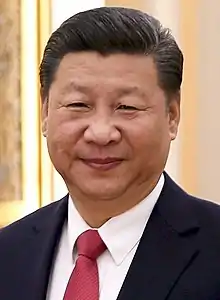
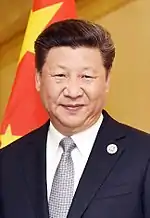

.svg.png.webp)

